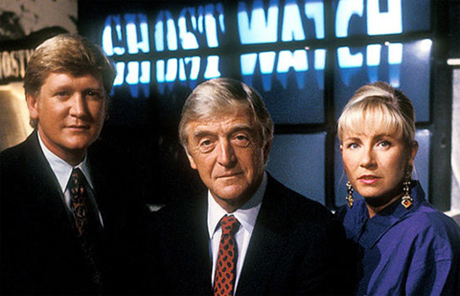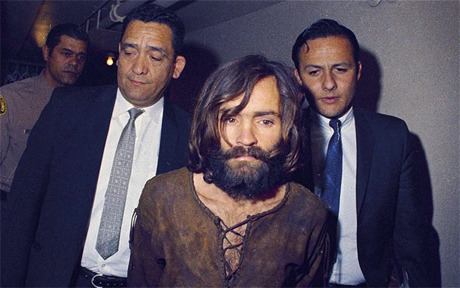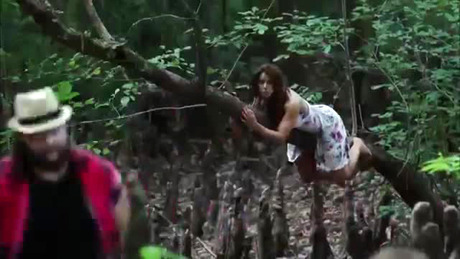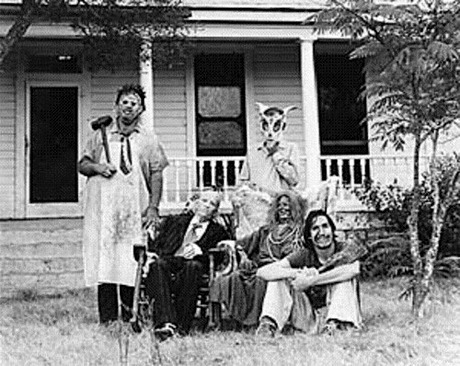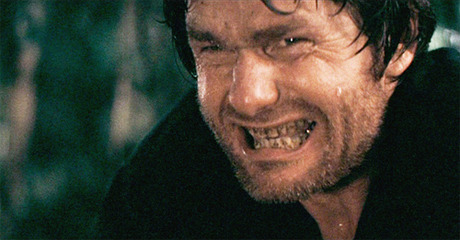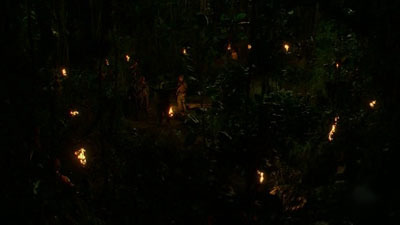Stuart Millard's Blog, page 33
October 25, 2013
Fifteen-Minute Messiah – The James Hydrick Story
The story of James Hydrick has long been on my list of ‘screenplays I’ll write for films I’ll make someday when I’m not just some random dude.’ To my mind one of the most fascinating things that ever happened, it’s a tragically little-known tale that burned very brightly for a short time, before, for reasons that’ll become clear as the story unfolds, it was consigned to the historical waste bin. It exists online only in scraps — VHS rips of TV clips, transcripts, mugshots — and I wanted to unravel and piece together as comprehensive a take as possible. So settle in, because it’s a long ride, and you and I are going to some super weird and dark places.
In October of 1980, twenty-one-year-old Hydrick, mumbling through a bumfluff moustache, strolled into the offices of Utah’s Salt Lake Tribune, and announced his presence to the world by turning the pages of a book, spinning pencils, and making the leaves of a potted plant flutter; all with the power of his mind, like a newly-crowned prom queen dripping in pig blood. With local news always on the hunt for quirky time-fillers, Hydrick’s star began to rise, and inevitably, he quickly found himself manipulating stationery on the national stage.
He made his televised début that December, on an episode of That’s Incredible!, a hugely popular showcase for the weird abilities and true stories of regular folks; most famously, a little boy who was prodigiously good at golf, and grew up to be serial sex-haver, Tiger Woods. Appearing under the name Sum Chai, and clad in blue Kung Fu pyjamas, Hydrick drew audible gasps from the studio audience during an exhibition announced as “a demonstration of psycho-kinetic power,” immediately granting it a weird kind of legitimacy. A pencil swivels on the edge of a desk, a pool cue rolls on command, and toothpicks bounce atop a woman’s fingers. Toothpicks. As shows of psychokinesis go, it’s hardly Yoda raising the sunken X-Wing, but the hosts are wowed all the same. His demonstrations are dressed in gurns and showy flourishes of strain, held in poses for the camera; classical tableaux of a wise master; at one point, waggling his fingers over a presenter’s head as he helps her make a toothpick dance; an illustration of his claim that these undeveloped powers lay hidden within all of us.
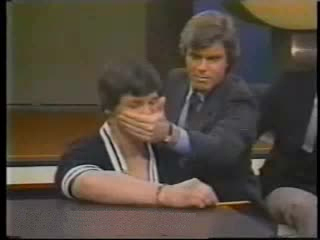
No blowing, bro
Strangely, the demonstrations are so small and intimate, that they play more like a fedora-wearing Pick Up Artist’s party pieces than the next step in man’s spiritual evolution. But while you might not have your wig blown off by watching the awesome power of the third eye make a pencil wobble a bit, Hydrick’s most famous move, turning the pages of a book with his mind, on the surface, is genuinely baffling. The entire five minute segment is played completely for real, like he’s just wandered in to show off his yo-yo skills, and Sum Chai’s explanations are rooted in Eastern wisdoms that blind with the pseudo-science of a worldly traveller who knows what he’s talking about. A brief challenge comes from the sceptical host of the three, who tells Hydrick “I can hear you blowing.” Hydrick places the host’s hand over his mouth, then moves the pencil — “an ordinary pencil” — anyway, leaving him wide-eyed and able only to parrot the title of the show as Hydrick struts back to his seat. Back in the days before we were drowning in so much media we told our babies to call for a pizza if they’re so hungry, so we didn’t get behind on our gaming podcasts, Hydrick’s appearance, on a show with an audience in the tens of millions, made him an instant star.
Hydrick’s origin story, at least, the one he was telling, reads like a b-movie comic book fantasy. Growing up a normal, regular boy, his powers developed under the training of “an old Chinese master,” and when asked to expand on this, in a later appearance on That’s My Line, his response was a fantastically vague “Martial arts. Gung Fu, Kung Fu, and the laws of nature…” Further waffle about the inner and outer self, the fourth level of consciousness, and “matching the actions of the mind to the motions of the body” served only to drown everybody in a distracting stream of vagaries. The cultural idea of the Mystic East is a racial hangover from the days of centuries past, when brave explorers wrote of Indian rope tricks, and Arabian princes whose court tigers could speak, along with other shit they or someone else made up. It’s patronisingly crass in 1980, and thirty years on, India remains a gap-year gadabout for white folks who want to “find themselves, you know, spiritually,” by the corpse-&-faeces-infested waters of the Ganges. There’s a notion that our commercialised First World is so tied up with mortgages and Playstations that our spiritual senses have been dulled, and we’ve gotten away from the real questions, man, unlike those sweet little ethnic-types who kept it real by being poor and not knowing who Kim Kardashian is. From the wise old Native American tracker in cowboy films, to monks who’ve been fifty years without a single wank, the East, in the most general of terms, is considered last bastion of the true magic, by the sort of people you’ll find reading aloud their daily horoscopes on phones made by third-world child-slaves.

Fierce bitch Blavatsky, lookin’ fly
History’s self-proclaimed mystics have always milked this teat until it bled, with the likes of Aleister Crowley and Helena Blavatsky similarly giving weight to their magickal personas with tales of sixth-sense-enriching travels, with the latter likely just pretending to have hung with Tibetans, as the occultist’s equivalent of “Chuck Norris totally taught me the death-kick, so watch out.” Lobsang Rampa, a Tibetan astral traveller who’d had a third eye drilled into his forehead, and authored a series of million-selling guidebooks on how to float outside of your body, was revealed to be plain old Cyril Hoskin, a plumber from Devon, but continued to shift books to New Age flakes the world over.
So too, James Hydrick found credibility in résumé references from the East, a guru passing on knowledge from the “Chinese master,” coupled with an extraordinary athletic ability. Whether jump-kicking basketball rims, or demonstrating Bruce Lee’s one inch punch on winded reporters, he must have seemed like something from the Kung Fu movie craze of the previous decade; like Lee himself, but with added superpowers. You can see how people may have made the leap, believing that a person with such control over the body could have similar control over their mind. He had a slightly otherworldly look, and with the cartoonish Chinaman’s bowl-cut, PJs and slippers, there was more than an element of yellowface, never further than a grotesque pair of comedy buck teeth away from the full Benny Hill. Personally, I always thought he looked like the Star Wars Cloud City Guard figures.
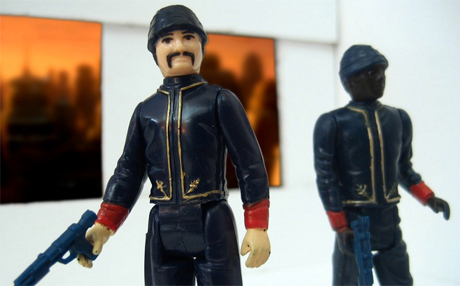
Hydrick and friend
Back home in Salt Lake City, Hydrick had amassed over 300 students-cum-followers, as the head of his own dojo, a centre that blended the training of martial arts and psychic powers, like a hybrid of Professor X’s mutant academy and the Cobra Kai. Envisioned by Hydrick as a monastery, with plans to expand into living space that could house and train 150 families, the whole enterprise was bankrolled by a local divorcee, who’d been so taken with the lad, she’d ‘adopted’ him, donating $16,000 of funding to help further his cause. Clearly no noob to the world of messianic figures, his ‘adoptive mother’ sent Hydrick on a fact-finding mission to the Ananda Church of Self-Realization, a Yoga-based cult centred in California. Fittingly, his patter that we all had the potential to do what he could produced something far closer to idolatry than the normal student/teacher relationship. Unknown to them at the time, Hydrick occasionally sent his disciples on field trips down-town, where they’d be attacked by local-street toughs that he’d paid off, as a test.
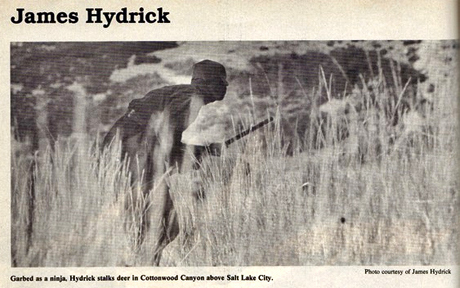
Dressed as a ninja and sneaking up on deer, yo
Like all good folklore, now a local celebrity, stories of Hydrick’s power grew in each retelling. Upgrading from the table-top magic of That’s Incredible!, his followers now spoke of his ability to turn the phone book pages from ten feet away, of blocking punches and finding hidden objects while blindfolded, and of sneaking up on deer to choke them out, like a redneck ninja. At this time, he also found the scientific seal of approval, having his powers authenticated by a science professor at the university of Utah. But not everyone was sold. A local couple, having taken him into their home as mentors, knew a part of the backstory that TV viewers didn’t, namely the jail-time he’d served in LA for kidnapping and robbery; but they weren’t worried. Not so the Utah police, who’d started to take an interest. With a violent criminal record and considerable fighting skills, he was already on their radar as a potentially dangerous threat to society, and now, he had a growing number of devotees, utterly convinced that their leader possessed superhuman abilities, and they could too. One of these disciples, a young man so obsessed with Hydrick’s powers that he suffered a complete mental breakdown, was eventually committed to an institution by his family. The man’s brother, fearful of Hydrick’s influence, wrote a desperate letter to a friend; investigative journalist and professional sceptic, Danny Korem. This cry for help, inspiring Korem to board a plane to Salt Lake City, would be James Hydrick’s psychic death warrant.
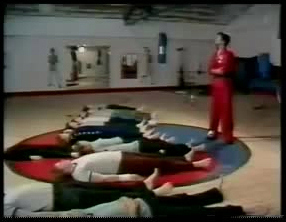
The Blow-bra Kai dojo
Meanwhile, Hydrick made his second big TV appearance, on the show That’s My Line. Hosted by Bob Barker, Line was That’s Incredible! in all but name, but this performance contained one important element the first performance hadn’t — James Randi. Possibly best described as Richard Dawkins playing Santa Claus at the office party, Randi’s made a career out of the casually methodical destruction of what he calls “Flim-Flam.” Psychics, dowsers, faith healers; all have seen their claims crushed beneath Randi’s tiny feet, as he brushes off their tricks and excuses like one would a cider-filled bluebottle from a shoulder at a summer picnic. At this point, Randi — billed as The Amazing Randi, the stage-name from his days as a professional magician — is 35 years into his life-long crusade, almost twice as long as Hydrick’s been alive.
Hydrick, as has everyone who’s faced him while claiming paranormal abilities, will be awarded $10,000, straight out of James Randi’s pocket, if he succeeds a demonstration to the sceptic’s satisfaction. It’s no spoiler to say that the cheque — raised to a million dollars in 1996 — remains unclaimed to this day, and exists as a hilarious tool to watch “psychics” like Sylvia Browne squirm, accept when pressured, and eventually back out of with pathetic excuses, like someone who said they’d go out to dinner with you when they were drunk.
[image error]
“During the war…”
As James Hydrick is introduced (under his real, Western name), the most startling thing is the sub-normal level of charisma on display. The man with hundreds of disciples back home is vague, awkward and mumbly, and when he finally tells Barker “I’m gonna move a pencil for ya,” you might be forgiven for being a thousand miles back from the edge of your seat. But he’s clearly upped his game since the first show, and makes a gigantic meal of the pencil trick, first taking an absolute age to precariously balance it on the very edge of the table, and then in the actual performance. This one a freebie before Randi’s conditions are put into place, is comprised of incredibly theatrical hand motions and gurns of concentration, manipulating the air with weighty dramatics, and unlike That’s Incredible!, it’s a full, long 40 seconds of pained face-pulling and uncomfortable silence before the pencil shifts. The telephone directory trick is similarly beefed up, like a magician who’s been told to work on his presentation, with Hydrick shaking his head as if defeated, something familiar in the work of mediums. At one point, he walks away in “failure” before returning to immediately flip the paper to applause, laying groundwork for the idea that his powers can’t always be made to work on cue.
As ponderous as this section is, it was edited down from 40 minutes of Hydrick staring down the phone book. Notably, during these initial performances, he refused a clip-on mic, insisting instead on an overhead boom. But the time for luxuries was over, as the two opposing forces were set to duel. Randi and Hydrick made for a visually interesting duo, side by side, with Hydrick in his full-on Kung Fu regalia, and Randi, as always, resembling a garden gnome that ditched the fishing rod to become a professor. Typically unfazed, unblinking, and mildly irritated, he was straight to the point, plainly accusing Hydrick of blowing with his mouth.
[image error]
“We meet again, old friend…”
Unknown to the Kung Fu Kid, Randi had taped the previous day’s studio rehearsal, with a mic pointed at Hydrick’s mouth, which when jacked up to high volume, detected strong puffing noises at the moments of movement. Randi’s first deathblow is to demonstrate how normal air currents can affect a pencil teetering on the edge of a desk, and with a quick swish of the hands, he mirrors what Hydrick did with a covered mouth on That’s Incredible! As the panel of early 80′s nerd-men doctors and astrophysicists are introduced, polystyrene packing peanuts are scattered around the phone book. If Hydrick is blowing, and the page moves, so will they. If not, ten grand’s his. As the test begins, the theatrics are going full-bore. Squatting, pacing, throwing shapes and hand motions like a mime pretending to finger a ghost; Hydrick’s psychic showcase is reduced to a series of stalling tactics. After 45 minutes of silent nothing, during which the fidgeting audience are let out for lunch, the first cracks appear in Hydrick’s Zen aura, as he tersely blames his failure on a static charge caused by styrofoam heating beneath studio lights. Immediately shot down by Randi and his panel of suits, with a scalding “The question is not valid because it’s making an assumption which is not true,” nonetheless, they humour him by having Barker “shake off the static” from the book. But Hydrick, who earlier refused Randi’s suggestion of a medical mask, is all out of stalling tactics, and after brief swishy poses and, in a break of character, laughing to himself, has nothing left but to admit defeat. In a final ignominy, having lost the chance at $10,000 to spend on a decent haircut, the show closes with James Randi perfectly replicating Hydrick’s trademark phone book piece.

Most devastating peanuts since that George Dawes outtake
James Hydrick left That’s My Line humiliated, but not beaten. He’d given enough excuses and “outs” for the believers to tell themselves he was still legit, and who could doubt when he was doing it right in their very hands? He returned to the dojo, where he’d continue to build his followers, and the JH brand, but two months later, his fifteen minutes ticked into the final five, when Danny Korem rocked up to Utah with a documentary crew.
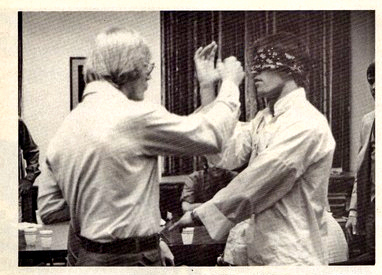
Blocking (really weedy, slow) punches blindfold
Korem, like Randi, is another highly skilled magician, but with an angry investigative journalist bent, and his motive goes beyond that of the usual tabloid TV takedowns. For Korem, bringing down James Hydrick is personal, not for only the mind-broken brother of his friend, but at the fear of what happens if he doesn’t. Only three years out from Jim Jones sweet-talking 917 followers into fatally poisoning themselves, and twelve from the Manson Family slashing up the Hollywood hills real good, cult leaders and what they were capable of were fresh in everyone’s minds. Korem was driven by the fear that Hydrick would become the bad Christ behind the next mass tragedy; a man who could be stopped only by someone with the skills to reveal his techniques as mere tricks, before something terrible happened. In hindsight, this is way less melodramatic a concern than it might initially seem.
The show itself, a special exposé entitled Psychic Confession — aptly as it turns out — ponderously broken up into Acts and narrated by Jack Palance, opens on footage of Hydrick in full Bruce Lee pomp. The physical prowess of the man can’t be denied, throwing Enter the Dragon faces and lightning fast punches, and doing push-ups on a single thumb. The urgency of Hydrick’s threat sees the defenestration of narrative subtlety, with savage edits cutting from the smiling devotion of Hydrick’s bankrolling divorcee to news footage of the Manson girls, and good ol’ Charlie himself, jovially chatting through his murder trial. When Korem lands in Salt Lake City, Hydrick’s the talk of the town, but by the time the credits roll, he’ll be a pariah.
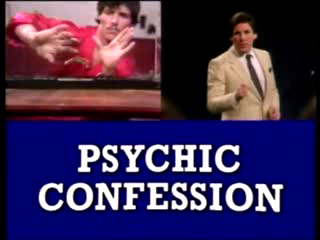
After this, Roger Cook assaults the Ghostbusters
Unaware of Korem’s motives to destroy him, Hydrick happily shows off a huge arsenal of crazy (and deadly) looking martial arts weapons laid out over his bed, like a kid making you kiss their favourite dolls goodnight. The stony-faced, but inwardly-shaking reporter patiently sits through the demonstration of the various ways to maim or kill a man, with Korem’s body used as the training dummy — “…this one breaks a man’s arm — like this.” — which must have only steeled his resolve to put an end to the charade.
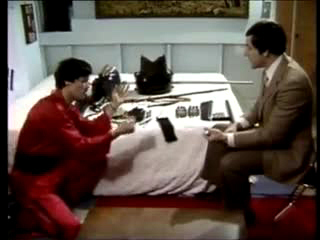
Not pictured: penis guillotine
Korem’s goal was to break down and replicate the psycho-kinetic trickery, as Randi had, and initial taping sessions, similarly restricted with a clip-on mic, resulted in Hydrick’s failure. It was too quiet, said Hydrick, can’t you put some music on? A second session, where Korem faked a feedback problem and instructed the crew to turn the audio levels down, saw the pencil and pages flying once more. Hydrick’s main weapon in creating believers had been his proxy-demos, where a touch of the shoulder or waggle of the fingers would transfer some of his power, allowing a person to move the object themselves, showcasing that psychic potential that he could help unlock, so it was natural he’d want to convert the news man. Korem, however, didn’t wait for the master to take control, and the look of bafflement on Hydrick’s face as Korem’s pencil moves of its own volition is amazing. When his newest, greatest trick, the rotating of a dollar bill balanced on a pin beneath an upturned fish tank, is — after much pre-show practise — performed perfectly by Korem, an open-mouthed Hydrick is left so confused that, until the reveal, he believes Korem to possess genuine psychic abilities. This unfamiliar loss of control, and sudden shift of the power balance, leaves Hydrick deeply rattled. In the film’s most astonishing section, an anxious, agitated Hydrick, shifting uncomfortably in his seat and rubbing his head, maintains that “something ain’t right,” refusing to even attempt the phone book trick. Finally, with a bewildered “I don’t understand, man. This ain’t cool at all,” his temper explodes, slamming his fist down onto the table before violently kicking it over. With this, he accepts the inevitable. It’s all over.
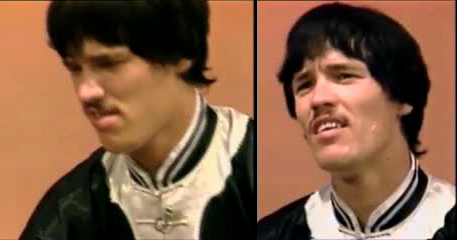
U WOT M8
We’ve become conditioned to a certain response when people in the public eye get caught doing or saying something they shouldn’t, which is a thing that happens with increasing frequency in these witch-hunt-on-a-bangwagon times. PR Team micromanagement kicks in, shoving perps into grovelling statements filled with backpeddling and penitent promises of fixing themselves, and only now, in the glaring light of public shame can they see what they did was wrong. Nobbed around on your wife? Off to rehab. Built your career on a house of lies? Chat to Oprah while looking down at your shoes. That’s how it’s always worked, and we know the familiar beats of the story arc before it plays out. Anyone publicly recorded dropping N-bombs will soon be off on a historic walking tour with Al Sharpton, while homophobic religious mega-pastors will blame their love of men’s anuses and crystal meth on literal Biblical demons, and vow to put it all behind them. For busted psychics though, it’s a little different. Admission of guilt sends that one-trick pony career to the slaughter-house, so they’ll fall back on furious self-denial and threats of lawsuits that never see the light of day, to keep the true believers on-side, because the sceptics never bought it anyway. But Hydrick? What he did was essentially tell the world to go fuck itself.
Once he’s calmed down from hoofing over the table, we get our Oprah session anyway, in highlights from two and a half hours of Frost/Nixon that’s part confession, part much-needed therapy. There’s a sense, as Korem opens with the line “Tell us, James, who you really are,” that he’s just happy to have somebody listen, although what he has to say often isn’t easy to hear. The real origin story of James Hydrick begins with his birth, and mother Lois, fifteen at the time and married to a thirty-year-old wifebeater, would abandon James when he was three. Already a victim of abuse and neglect, James’ father remarried to a woman who treated the child as though he were a dog — literally — making him eat and live outside, and chaining him to a tree having renamed the boy ‘Spot’. Hydrick was regularly gagged and beaten, and claimed to have suffered so many head injuries at his father’s hand, that merely remembering his past caused him physical and emotional pain.

Act III: The Prestige
The young Hydrick’s only route of escape was to retreat into a fantasy world, a place imagined up during the periods his birth parents would lock him in a darkened closet. The fantasies of Eastern monasteries and peaceful, Zen landscapes were so vivid, he could no longer discern between hallucinations or outright astral projection, and it was there he met the oft-mentioned Chinese mentor, Master Wu. He talks of Wu, a coping mechanism and imaginary friend, as though completely real, and the lines between truth, lie and fantasy are clearly blurred. It’s difficult to take the word of proven fantasists at face value, but Hydrick’s claims are corroborated in interviews with his mother and father, and aunt, who tells a story of the mother anally violating him with a paddle for crying in the night. While his father, an ex-chain gang convict, worked shifts bouncing at honky tonk bars, James would sleep in the car outside, before eventually being offloaded into the care system, where he was shipped around various foster homes. Aged nine, he was sent to “an institution for the mentally retarded,” a hand-washing solution for unwanted kids the system didn’t know what to do with, where his increasing outbursts were calmed with doses of tranquillisers. At sixteen, legally free to leave, the dog was now stray, and upped to South Carolina where he was homeless, but survived with the help of various church groups.
The following year, aged seventeen, he hitch-hiked to California to reinvent himself. His final foster parent would receive a number of letters informing him of Hydrick’s exciting new life, where he was starring in Kung Fu movies as “the new Bruce Lee.” In truth, those were penned from the jail where he was serving a three and a half year sentence for kidnapping, filling his time studying the manifesto of “Alphabet Bomber” terrorist, Muharem Kurbegovich, and perfecting a series of party tricks. Back in the present, Korem hits him with the classic shamed-celeb question, of whether he felt bad over what he did.
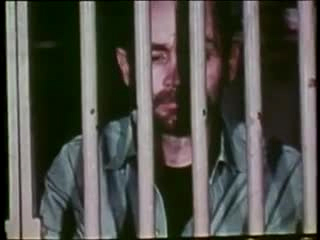
One of many super-subtle cutaways to Manson
“I don’t feel bad at all,” he replies, with an admirable lack of repentance, “I tricked them for their (own) good.” Like Korem had been too, Hydrick was fascinated by magicians as a kid, particularly in the sense of wonder and adoration, and the power they held over an audience. Quite openly, he admits to presenting the tricks as powers to get attention, merely wanting to be known and recognised, and as someone who’d never been shown any love, to just have people give a shit. “I tricked the whole world” he says, with a smile, playing off the whole thing as a successful experiment to see just how dumb America and the world really was. Though, it’s more telling when he wonders aloud how come, if the people were so-called intelligent while he was so-called dumb, he got away with it, concluding “Surely I’m here for a reason?”
With that off his chest, Hydrick whips back the curtain to reveal his secrets. Yes, it was all just super-focussed puffs of air, without moving his mouth or face, a skill perfected during an 18 month stint in solitary confinement. Terrified guards gave him a wide berth, thinking he was possessed, and his cell haunted, as they felt ghostly winds on their necks, and the prison chapel was filled with regular demonstrations of the Lord’s power. Having befriended the chaplain, who’d been teaching the illiterate Hydrick to read, he challenged himself to convert twenty inmates a day to the everloving arms of Jesus, by calling out for God to show himself by turning the pages of a Bible and, well, you can figure it out. Post-jail, he travelled to Egypt, performing for the family of president Anwar Sadat, where he faith-healed a woman who’d had a heart attack. Hydrick knew he was a phoney, but she’d believed, and that was enough, which seemed to be the mental light-bulb that lit the way to the offices of the Salt Lake Tribune on his return to the US.

The Hydrick trademark
It’s easy to think Korem might have been overexcited in his fears about the potential for another round of killer cultists, and that, sociopathic tendencies aside, Hydrick was little more than a damaged fantasist, but the doc ends with him imprisoned once again, having been arrested two days after recording for receiving a batch of stolen firearms. Previously, while noting his inability to read and write, Hydrick claims that he’d been contacted by the Alphabet Bomber of nerve gas terrorists, Aliens of America, and Sirhan Sirhan — who’d assassinated Robert F. Kennedy while claiming he was under CIA mind control — with a view to using him as a messianic cult figurehead, to brainwash and recruit members with promises of psychic powers. There’s also a clear parallel between Hydrick’s backstory and that of Charles Manson, with each having spent very little of their adult lives in the outside world; being abused, passed around, and raised by the system, and re-entering society with the skills of people-control they’d learned inside, having completely reinvented themselves. Korem’s film ends with a jail cell interview, where Hydrick laughs off an attempted hanging as a prank, “just playing dead,” before it cuts to black with a caption that plays like the set-up to a possible sequel.
“On October 23rd, 1982, Hydrick escaped. And he has not yet been found.”
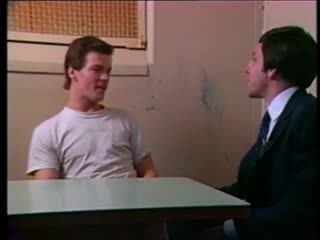
Home is where the heart is
As with the Manson similarities, Hydrick’s brutal upbringing is the psychological recipe behind every classic serial killer, and had he not been drawn to the more passive ideas of Eastern mysticisms, it’s easy to see another ending to this story. There’s something about the world of martial arts that seems to attract Walter Mittys. It’s a posturing sub-culture filled with men who need to let everyone know how tough they are, where being better is easily defined by belt colour, or, like Alan Partridge shouting in a carpark, the number of Dan’s at the end of your title. As with the tall tales of Steven Seagal, Frank Dux, or Count Dante, it’s a shadowy world just mysterious enough to keep things unverifiable. Hydrick’s Chi powers and ninja stories bring to mind Marcus from Big Brother fighting 100 men blindfolded, or the fabled Dim Mak Touch of Death, which every eighties kid’s hard older brother was alleged to know. Even Hydrick’s arsenal reeks of playground boasts of owning nunchucks which were always “at the cleaners” when you went over their house.
Even so, aspects of the story are particularly remarkable. You have to admire the moxie of a street kid with a third grade education, reinventing himself to finally take that affirmation he’d been craving. He had fooled the world, if only for a little while. More curious is his status as a martial arts badass, even if it was just the kind of showy bullshit that looks good on film (His one full-contact karate contest ended in defeat). There’s only five years between his hitch-hiking to Cali and That’s Incredible!, with a mere 18 months of that time spent free, but he was jiving and kicking like someone who’d been training his whole life. There was no evidence of any martial arts background before he emerged reborn as Sum Chai, claiming to be entirely self-taught, until an interview in ’89, where Hydrick claimed to have witnessed, aged six, his brother being beaten to death, and took up karate to protect himself and his siblings. But as always in this tale, the truth remains a murky, half-glimpsed ghost.
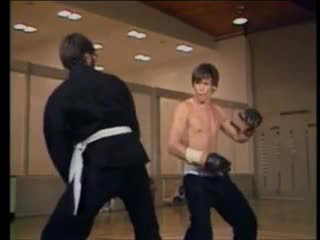
Bruce Near-ly
Where Hydrick’s story, which seems tailor-made for retrospectives or big-screen adaptations, becomes trickier, is in the part following Korem’s film. But things will always get uncomfortable when the correct answer to the question “Where are they now?” is: “In a maximum security unit for violent sex offenders.”
In 1988, Hydrick was charged with multiple counts of molestation, of three boys aged 10-13. Having travelled back to California to attend a karate tournament, he ended up staying, integrating himself into the Huntington Beach martial arts scene, and befriending Elvis’s karate teacher, Ed Parker. When a warrant was put out for his arrest, Hydrick, living out of state, was extradited back to California. Evidently, neither the years, nor Psychic Confession had dulled his legend, as freaked-out guards from the DA’s office became terrified as Hydrick “used supernatural powers” to make the van they were travelling in rock violently, and on reaching their destination, they warned the jailer not to look him in the eye, lest he cast a spell. I can’t help but think back to Manson at his own trial, catching the gaze of prosecuting attorney Vincent Bugliosi, who looked down to find that his watch had stopped, before glancing back up at a winking Charlie.

Hydrick today
The ensuing court case was a medium-sized media sideshow, with Hydrick — by this point, rechristening himself as ‘Sir James’ — reliving past glories like Danny Korem never happened. Now notorious for slipping out of handcuffs and multiple prison escapes (downplayed by one official as “walking away from minimum security facilities and some pretty rickety jails.”), Sir James fell right back into the fantasy world of Chinese masters and mind-magic. Speaking to a Kung Fu magazine, he talked of escaping from 148 prisons, and conjuring up 80mph desert winds for Egyptian dignitaries. However, in a phonecall to the press regarding the trial, he was quick to establish himself as a regular guy who breaks bricks and concrete with his hands, and, “If I have supernatural powers… I don’t know it.” At this point, if Korem had asked Hydrick to tell us who he really was, I don’t think he’d have known, and news reports of the time paint his frazzled public defender trying to bat away endless questions about wacky superpowers.
Interestingly, he introduced a third, brand new backstory into the narrative. This time, a Tibetan monk encountered during a wilderness year spent wandering Georgia’s Savannah River takes the wise old mentor role, imparting all the Kung Fu and psychic ability that’s now back to being completely for real. Meanwhile, his siblings talked up the escapes in interviews, hexing the guards and strolling out of the exit, while prison officials countered with less paranormal tales, like the time he rather unmystically karate kicked a steel door off of its hinges. That said, feats like the kicking down of concrete walls, and 1982′s pole-vault over a prison fence are impressive in their own right. After he’d been charged, the cover of Inside Kung Fu magazine, a big deal in the martial arts world, featuring Hydrick bore the headline “No Guard Could Break Him, No Prison Could Hold Him.”
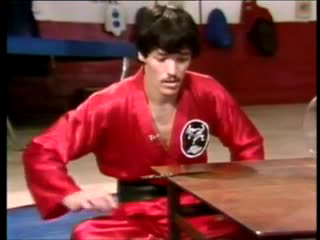
Hydrick’s pencil trick > Joker’s
As his fame caught a second wind, Hydrick’s life had become a constant battle between the ugly truth, and the fantastical lies he’d seeded whenever he opened his mouth. A persistent thorn in the side of law enforcement, Sir James is described by one weary sheriff as someone who had “made a right good pest of himself.” He was even appearing on television again, with a shot on Sally Jessy Raphael talking up his psychic powers leading to his rearrest, when he was recognised by a law official.
In the summer of 1989, pleading guilty in a bargain to avoid prosecutors pursuing a 33-year maximum sentence, thirty-year-old ‘Sir’ James Hydrick was sentenced to 17 years. According to police reports, Hydrick would take the boys to his home and teach them tricks in exchange for sexual favours. Character witnesses relate a Michael Jackson-type figure, childlike himself, and preferring the company of children to adults, having been robbed a childhood of his own. Today, still known as Sir James, Hydrick is 54, and deemed too dangerous for release. Refusing to participate in treatment programs, he’s been diagnosed with paraphilia, paedophilia, and anti-social personality disorder. Regardless of the terrible things he’s done, his story is one of the weirdest, most intriguing rise ‘n falls in history, and though it’s all but been forgotten beneath the folklore of more celebrated monsters, like the Mansons of this world, in the system that became his home, Hydrick’s reputation continues to precede him. In May of this year, at the hearing petitioning for his release, 33 years since his televised début, tricksy escape artist, habitual liar, dojo master, convicted sex offender, and one-time World’s Greatest Psychic, ‘Sir’ James Hydrick, was ordered by the judge to be chained to the defence table, just in case.
***
Until Hollywood options this piece for a movie and hires me as the screenwriter, you should check out my Beach Diaries books on Amazon.com or Amazon UK so I’m not forced to fake psychic powers just to feed myself.
Also, if you dug this, check out some similarly-themed stuff I’ve posted on here:
* Forgotten Forteana — The Werewolf Trials
* Jimmy Savile and David Icke, All the Pieces Matter
* My Greatest Fear (aka the mental health slide of conspiracy theorists)
* “Back off, man! I’m a fantasist!” (aka the Ballad of Derek Acorah)


October 14, 2013
Exorcising Ghostwatch
For years, Ghostwatch functioned like an urban legend, a “do you remember…” creeping into the conversations of British teens and early twenty-somethings who’d grown up in the nineties. It was its own self-perpetuating myth, and students or bored workmates took a break from irony-led nostalgia ‘bants’ about Pat Sharp and the Funhouse twins to compare stories about how frightening it had been, or how they’d twigged it from the start. But that’s all it was, a shared ancestral memory, like that time Uncle Albert fell up the stairs at the Comedy Awards and cut his head open. Having aired in a slot where most people didn’t think to stick a blank tape in the video recorder, back in the day before Youtube when everything existed forever, and never being repeated, all you could do was mythologise. And then suddenly, in 2002, there it was, available on DVD. No longer a ghost itself, but a tangible, rewatchable thing that we could get our hands on. I did get my hands on it, but like the Necronomicon, I’m issuing a grave warning that it’s better left alone. Not because you’ll unleash an ancient, sleeping evil into the world, but because it’s not quite the experience you remember.
There isn’t a great history of Halloween television in this country. The most notable example came in 1987, when Paul Daniels faked his own death after a trick “went wrong,” slamming him shut inside the steel-spiked bear-trap of an iron maiden and silently cutting to black. I was eight years old at the time, and wept for the life of dear departed Daniels, until he popped up after the news to let everyone know he wasn’t dead at all. What larks! We all talked about it in the playground the following Monday, where I pretended I hadn’t cried, or been fooled. Though Living TV’s plied their yearly Most Haunted Live shows, mainstream Halloween scheduling petered out once we got into the new millennium — the holiday itself never really caught on over here — and now you’re lucky to find a 1am airing of John Carpenter’s eponymous slasher. I for one yearn for a themed night of programming, including a special Eastenders where Phil Mitchell gets bitten by a vampire and has to be staked by Ian Beale before sunrise, as he slaughters Walford’s residents in a violent, psycho-sexual bloodlust. Consequently, barring 2010′s fantastic Psychoville special, Ghostwatch was the last, and perhaps only, great piece of British Halloween television.
Paranormal TV is long-since a genre (with many branching sub-genres) of its own, dominated by the cottage industry of Most Haunted types, where nervous people stumble around basements in green-tinted nightvision, evoking flashbacks of Paris Hilton’s sex tape; or shows where liars pretend to have psychic powers. But back in the early nineties, there was no such thing. Technology hadn’t evolved to the point where real-time stakeouts were feasible, and Fortean programming took the form of documentary series that recanted historical and eyewitness reports; the likes of Arthur C. Clarke’s Mysterious World, or ITV’s Strange But True; a fancy televisual scary story being read by the fireplace.
Ghostwatch was heavily and openly inspired by the Enfield Poltergeist case, a well-publicised ‘real’ ghost story, where a single mother and her four young children — though everything centred around the two girls — were terrorised by an unseen spirit. At its heart, Enfield seems to be the story of a broken family, and an elderly paranormal investigator driven by the grief of losing his only daughter to a car accident. In hindsight, they shared a symbiotic relationship, with both parties giving the other what they needed, and the initial investigation turned into a drawn-out affair that led to the real Peter Venkman, Maurice Grosse, spending over a year at the house. Grosse was no dummy — he’d invented the rotating billboard — but the continued activity at Enfield, a classic collection of every poltergeist trope rolled into one, was seemingly paranormal paydirt. Sceptics accused the girls of faking the incidents, and they were caught red-handed a number of times. It’s probably no coincidence that the poltergeist cliche, and even psuedo-scientific explanation, is that they almost always manifest around a girl caught on that alienating crossroads intersecting puberty with the desire for affirmation and attention.

The Enfield cast, with Janet in the middle
There’s a phrase, ‘Hauntology,’ a philosophical term by Jacques Derrida suggesting the present’s only contextual existence is in its relation to the ghosts of the past; the ideas and look of which we’ll return to at the end of history. But Hauntology best describes that suffocating sense of unease about the recent past. The British feel this most strongly in the asthetics of the seventies, which is why that creeping dread kicks in with the brown wallpaper and dead, grey buildings of that era; public information films where children are fried black on pylons, and the Grim Reaper lurks by uncovered ponds; droning, atonal synth and sunken faces draped in faded autumnal colours. The Enfield Poltergeist is Hauntology 101, with its breadline council house setting, Cold War-era technology, and pair of buck-toothed working class children at the centre, all viewed through a chilly veneer of local newsreels. As time goes on, the twin fables of the Enfield Poltergeist and Ghostwatch become more and more intertwined. The 21 years passing since Ghostwatch aired have caused it to become just as hauntingly distant, forever frozen in a fuzzy snapshot of early 90′s analogue Britain. Close enough to touch, but alien enough to evoke the shivers, it slots into Hauntology like a cold, black glove, and if there’s any remaining creepiness to be found in its ninety minutes, this is now where it’s hiding.
[image error]
“Jimmyyyyyyyyyyyyyyy!”
Historically, Ghostwatch aired during the period when Noel’s House Party was burning up the ratings on a Saturday night. We were, I guess, easily amused back then, and a more innocent audience. Four channels and no internet made for poor pickings if you wanted to veg out, but it also meant you could get everyone in a single, well-focussed blast, rather than the virally-filtered slow burn of now. And get everyone they did.
Despite opening on the Screen One logo (a BBC anthology drama series) and a ‘by’ credit for the writer, it was what we’d now call a mockumentary, with no further clues or winks to camera to let you know that events were dramatised. All the standards of live television were present and correct, from stilted fingers prodding at earpieces while footage was being cued, to an in-studio expert, existing mainly as a contrary opinions foil to be patronised by the host. Interactivity was limited to calling the switchboard, a sight familiar from Saturday morning kids shows, where people on rotary phones and headsets scribbled onto clipboards, with even the number — 081 811 8181 — instantly recognisable as the one you dialled on Going Live to ask the British Bulldog how much he ate, or to call Five Star a bunch of shit-arses. On location, there were locked-off CCTV cameras, and wires snaking across the floor, as the roaming cameraman stumbled through the cluttered architecture of the house, with jarring movement and zooms that felt very raw and ‘live’ at the time. If you’d not been paying attention during the first five seconds, until things really went nuts, you’d probably buy it, by which point, they already had you. (Incidentally, anyone calling the number given out was supposed to hear a pre-recorded message confirming events as fictional, but so many people rang that the line got jammed, and the engaged tone accidentally tallied with the apocalyptic storyline, further fuelling the panic.)

Number later used to contact a drunken and confused Scott Hall
What really set everybody up for the fall was the smart choice of having recognised, trusted presenters play themselves. In Michael Parkinson, Ghostwatch found itself fronted by one of Britain’s most well-regarded faces. The labia-eyed interviewer turned free-Parker-pen-salesman couldn’t have been more highly considered, despise regularly coming across as a bit of a high-seated, pompous dick who’s never not aware of how great everyone thinks he is. Whether he’s helping Muhammad Ali read from the Bible or being a shit to Meg Ryan, he’s not messing with you, and his presence was the green light that caused millions of viewers to flick off their sceptic hats, even as a paedophile ghost was urinating on a carpet. It’s 1992; TV people don’t lie, especially not journalists. We’re only 15 years out from the national apoplexy of newsreader Angela Rippon showing her legs on Morecambe and Wise. Today, where every prime minister, president and prince feels the need to appear in dreadful charity night comedy sketches demonstrating how they’re not afraid to laugh at themselves, it’s hard to imagine people feeling betrayed that someone from the serious side of television had done something so frivolous, but they did.

Luckily technology doesn’t date
Mike Smith, Parky’s studio-based co-anchor adds another familiar, earnest face, but has little to do, outside of his role as the real-life husband of Sarah Greene; she of children’s TV and urban legends about rugby teams. With him in the apparent safety of the studio, and her out in the field at the house, they’re connected only by the feeble technology of the day, and Smith can only watch impotently from the sidelines when the shit really starts to go down.
Meanwhile, Greene’s co-presenter Craig Charles exudes the sort of matey, cheeky chappiness that’s been lost in this era of self-serious, walking-haircut presenters, desperately trying to clutch onto their auras of detached, casual cool, as the crow’s feet etch their hollow, guy-linered eyes; like a sixth former’s deep breath before entering the common room with an “Alright, cunts?” Charles is Ghostwatch‘s sceptical office joker, dicking about by banging on walls and leaping out of an airing cupboard in a rubber werewolf mask, the standard narrative fake-out scare in the first act of every slasher. With Parkinson rolling his eyes as he shouts “Boo!” at the camera, Craig Charles’ performance as an irritating, unfunny turd is the most realistic aspect of the whole affair.
From the brief credit sting, we’re straight into Parkinson, solemnly posed against a skull-laden mantelpiece, warning people of a nervous disposition. As things move to an outside broadcast of the council house itself, we get a pre-tape of sturdy British gaffers loading equipment into vans, in that weird late 80s-early 90s fad where TV, particularly kids TV, had a travelling circus vibe, with everything hosted on a boat or train or space ship, and parking up at a new destination every Saturday morning. The thing of broadcasting from residential streets was still relatively new at that point, with a feeling like, “Television’s come to us!” when residents of normal streets got the chance to stand in front of the camera frozen with fear or waving. It’s easy to forget, with most people carrying a portable video camera capable of instantly sharing footage with untold millions, that the world was so big back then.
[image error]
“Try not to shit yourselves, you plebs.”
Before the story proper gets underway, we’re also introduced to the crew, turning the lens back on the camera and sound men, which was another thing people did back then, like with Challenge Anneka‘s attempts to turn a dad-like soundman into a cult figure, or the machine gun blasts of offscreen laughter by the Big Breakfast sycophants at the wacky antics of Chris Evans, which they simply couldn’t hold in, unlike the stuffy professionalism of those other shows that weren’t having as much fun as they were (a fad that’s stuck around all the way to The One Show); “Go on, laugh, you pricks! I can have you killed!” Ghostwatch‘s step-son, Most Haunted, took this to the extreme, turning riggers, PAs, and guys “definitely picking up some tapping” on boom mics into a full supporting cast, each with their own ghost-hunting traits — this one gets scared; this one’s always thrown around by witches — and frump-filled fan clubs, far extending the life of the franchise. For a drama though, it’s a nice touch for when the shit goes down, to not have them be faceless red-shirts.
As with Enfield, Ghostwatch‘s haunting centres around a pair of young daughters living on what we’re told is a violent council estate, with a divorced single mother at the end of her tether. When the council refused to take her ghost complaints seriously, she turned to the only help that was left; television. Pipes, the cultural Candyman for British nineties kids, was so called because he’d bang on the radiator pipes, like that other haunting old spectre who does a lot of banging, your mum. Its opening ghostly gambit, 4am camcorder footage of the girls’ bedroom, Kriss Kross posters and all, plagued by thumps and levitating objects, pre-dates Blair Witch by seven Earth years, and a thousand cultural ones. It feels incredibly hokey, which is the story of Ghostwatch as seen in 2013.
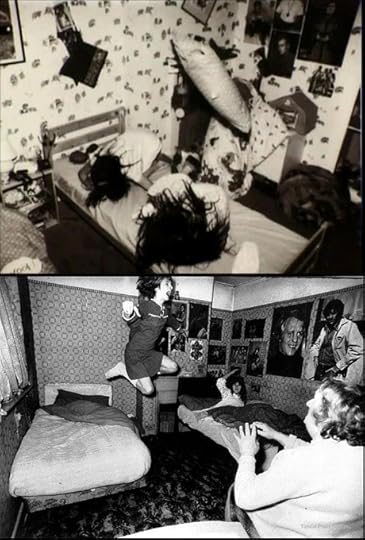
Top — Ghostwatch, Bottom — Enfield
Like in modern, supposedly-factual ghost hunting shows, the technology is half the story. We’re introduced to the monitoring equipment by a central castings tech-nerd with a ponytail; essentially a bank of CRT monitors in a white paedo-van, and informed that the location was chosen out of all the other haunted houses “by a computer program.” There’s no green night-vision, but there is an infra red heat-seeking cam, aka Predator vision, a Chekov’s Gun laying in wait for the final reel. At one point, a “piece of sophisticated technology,” another bulky 4:3 television screen, is wheeled on to the studio floor, like when it was time to watch Look and Read in school. A ghost’s voice is played back on an enormous reel to reel tape machine, and clips are constantly being run back on the studio monitor, complete with high speed rewind noises and wavy tracking lines. And there’s that unease. Not in the ghostly happenings, but the bleak, nostalgic sense memories of Thatcher’s Britain; of climbing rusted gates to play in the field behind the train tracks, throwing lumps of asbestos at each other’s heads until it gets dark.
Amid stopped watches and bent spoons harking back to lunatic fantasist Uri Geller, as Pipes asserts his grip on the house, the clearest Enfield riffs emerge in specific beat-by-beat lifts. During a possession, one of the daughters speaks — via rubbish vocal effects — in a deep, guttural voice, although she doesn’t repeat my favourite Enfield utterance, when kindly Maurice Grosse was called a “fucking old sod.” With a few decades hindsight on Enfield, it’s baffling to see so much confusion, as grown adults fail to explain what, quite clearly, is just a girl putting on an old man voice, while using a large overbite to hide the movements of her mouth like a bad ventriloquist (The voice was said to be coming from behind her). There was a lot of talk about the false vocal folds, and how anyone who tried to replicate it simply couldn’t keep it up for any amount of time, but she’s basically doing the Phyllis Pearce impersonation I did constantly as a kid, and the inside of my neck’s just fine.
Even so, Ghostwatch fails to capture the outright oddness of the Enfield possession videos. As the croaky voice emerges from 11-year-old Janet, the disconnect between her eyes, alive with barely-contained childish glee as they flit across to the reporter present, coupled with the bored posture of her body, despite how silly it looks, is actually pretty unnerving. By trying to hold from giving herself away, the eyes and the body don’t match, and in that way, it feels like a possession. I also think it’s the balance of power. It’s all with her, and she knows it.
When Ghostwatch tackles the issue of fakery, by catching the girls in the act, they sob to their mother that “all we were were noises to you” and “we just gave you what you wanted,” and it feels like the latter line was written with a decade’s as-yet-unmade ghost-hunting television in mind. Like with the X-Factor or Britain’s Got Talent (to name but two of infinite quasi-reality shows), once you spot the pattern to the weekly editor’s blueprint, it can’t be unseen. My own personal most hated spook-TV trope is the requisite “Omigod! Did you see that?!” cliffhanging ad-bumper that literally never results in anything being seen, ever.
Ghostwatch is at its strangest in the weird scatological turns it takes. Among a handful of pre-taped “true story” ghost confessionals, a man with a pixellated face talks about ghostly saliva appearing on a plate of mackerel, and finding handfuls of human shit smeared all over his bathroom. The understairs cupboard where Pipes lives (and died) is referred to, over and over again, as ‘the glory hole’, which if it’s anything like the ones in the toilets on Littlehampton seafront, might explain any residual ectoplasm. Voxpops with locals off the estate consist of anecdotes about dead, pregnant dogs with their foetuses scattered beneath the swing set, stabbed five-year-olds and missing — presumed-raped-and-murdered — kids, all told to Craig Charles, breathing through his mouth in an NFL jacket.
[image error]
“A ghost done a poo. And probably some wee.”
Throughout the show, the increasingly powerful figure of Pipes inserts himself into proceedings via a number of barely-visible cameos, like a mildly horrifying Where’s Waldo/Wally. You may have spotted him hiding behind a curtain, or reflected in a patio window during a whip-pan around the room, or my favourite, casually mingling, unseen, with the neighbours outside. These are admirable in a time when the pause button made it a chore cracking one off over bikini scenes you’d taped from Home and Away, because everything looked like a quivering mass of uncooked sausage meat. Didn’t stop me though. The Pipes-bombing does provide the one legitimate beat of actual tension in the entire show, during a shot of the glory hole door swinging slowly open, where we catch a split-second half-glimpse of the fella before the camera man keels over.
Crew members hitting the deck are nothing new to former viewers of Most Haunted, where they’d tumble with increasing frequency once the precedent had been set. By the final seasons, jaded audiences were treated to multiple bouts of nightly collapse, riggers hurling themselves down flights of stairs as gently as possible, and my favourite, attention-seeking Stu (of the gentle staircase tumble) who “fell into a catatonic state” while standing up, and couldn’t be roused by shouting paramedics for a full half hour, but didn’t go to the hospital for a brain scan or anything. (“We just gave you what you wanted…”)
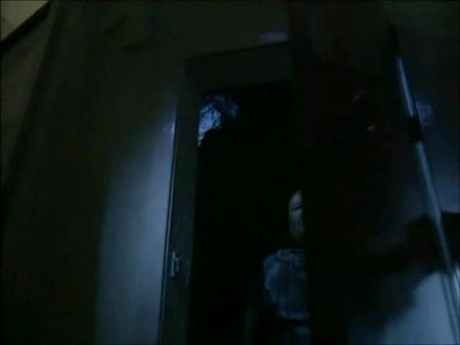
Alright, Pipes mate?
Whether or not the Pipes easter eggs worm their way in subliminally, the one part of Ghostwatch that does work is the clever piecing together of his backstory. Eventually revealed to be a tormented, cross-dressing paedophile who hung himself in the glory hole and was devoured by his pet cats, the last expositional holes are filled in by a caller. Parky’s imploring of this final caller not to hang up ranks alongside The Room‘s “I definitely have breast cancer” as one of the least impassioned things ever committed to screen. In fact, throughout Parkinson switches back and forth between guffawing scepticism and sullen fear with no middle ground, and not a flicker of emotion. The ‘real’ Pipes, Enfield’s soul behind the sheet, outed himself as a man named Bill, with a much less tabloid origin story, as explained via the possessed little girl:
“Just before I died, I went blind, and then I had an haemorrhage and I fell asleep and I died in the chair in the corner downstairs.” Although the cavalcade of other (identical) voices coming out of Janet, numbered at times by the girls between three and sixty, are never gifted origins of their own. Some have names, however, and Dirty Dick, Andrew Gardner and Stuart Certain sound like nothing but the typical childlike naming of imaginary friends.
Fittingly, it’s the spectre of technology that brings everything to a close, as the ghost literally gets in the machine, possessing the equipment at the BBC and pulling the old Speed trick, by playing back pre-recorded CCTV to fool the people into thinking they’re watching a live feed. Ghostwatch‘s punchline is that the show itself acted “like a massive séance,” unleashing Pipes onto the world through the watching screens, bringing him into your home, and the studio fills with ghostly wind, blowing Parky’s papers all over the place yet still eliciting zero emotion from his Yorkshire face.
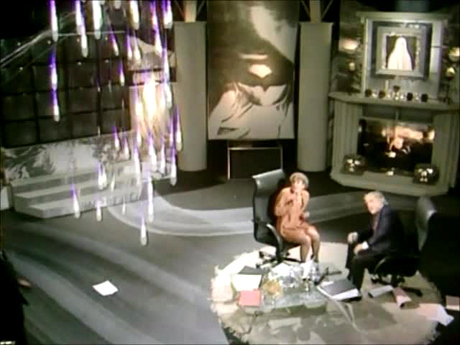
This is the way the world ends: not with a bang, but with bad effects and terrible acting
The big killer that completely ruins Ghostwatch through modern eyes is how utterly fuck-awful the acting is. The performances of the three leads — two of them child actors — are just terrible. Did we have lower expectations back then? Has acting improved so drastically over the last two decades? If you saw acting like this in an infants school play, a beleaguered deputy headmaster would be hiding in his office while livid fathers kicked in the door to get their raffle money back. It particularly stands out in the vérité setting, where shaky handhelds and technical pauses don’t lend themselves to broad, soap opera ac-ting, and none of the cast have the skills to pull off the required nuance. But everyone’s bad, including the celebrities. I don’t understand the psychological thing of presenters acting badly while playing themselves, reciting something they’d usually be reading from an autocue anyway. Get your Simon Cowell types to parody themselves in a skit, and suddenly “That’s the worst thing I’ve ever heard…” sounds incredibly fake and self-aware. This is in evidence throughout Ghostwatch, with people whose job is to read scripted lines off a board, into a camera, doing exactly that but sounding super fake. As things come to their apocalyptic finale, Parkinson, now possessed by Pipes, recites a child’s nursery rhyme with a fittingly unghostly air, like a man reading out a shopping list to himself in Tesco’s car park. It’s the only appropriate end for something remembered as being so terrifying, but which in reality has all the intentional scares of a Dracula episode of Chucklevision set in Fartsylvania.
Enfield didn’t have such a big finish, petering out like these things do when one or both parties get bored. Janet, now in her fifties, has made a handful of appearances on retrospectives, and is clearly, if you’ll pardon the expression, deeply haunted by the experiences of her childhood. It’s hard to imagine the circus of those fourteen months; the push and pull of investigators and reporters interested in their family for only as long as the noises and voices continued. However real it was at the time, it’s clearly only gotten realer for her as the years have elapsed; as with the viewers of Ghostwatch, chatting in the pub about how amazingly realistic it was, that they actually shat themselves, honest.
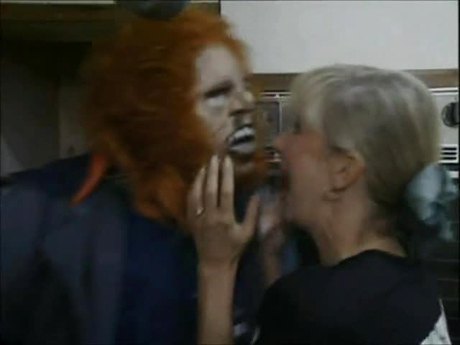
Piss off, Lister, you tit
Nowadays, you couldn’t be scared while watching Ghostwatch even if you were being savaged by a pack of wild dogs. Hauntological creepiness aside, it’s a quaint look at what those silly folks of twenty years ago got so freaked out over. I’ve a very clear memory of going to the newsagents the next day, and seeing angry headlines on the front page of all of the late editions; BBC HOAX FURY and the like, with Parkinson’s face guiltily splashed, like the mugshot of a freshly unveiled Communist traitor. On Monday afternoon, a fresh-from-the-glory-hole Sarah Greene turned up in the CBBC broom cupboard, to say that lots of children were talking about Ghostwatch, especially about how the special effects might have been done. Even at the time, with such a nudging emphasis on special effects, I recognised the patronising way of deflecting criticism by saying “Look, she’s not dead, so stop being silly,” without outright acknowledging the culpability of a deliberate hoax. I wonder what that phonecall was like? “Sarah, we need to you calm the masses. Get yourself to the BBC.” I also wonder how many wept for her demise, like I had for Paul Daniels?
There was a decade-long ban on repeats, which seems absolutely insane now, but doubtless only added to the mystique, like the Video Nasties list, or everyone who said “Was that it?” when The Exorcist was finally cleared. Likewise, the Enfield Poltergeist, for all its talk of being Britain’s most convincing ghost story, has aged worse than Micky Rourke. It’s impossible to imagine anybody in 2013 giving the time of day to what’s clearly just two girls mucking about, and for all the anecdotes of spectacular paranormal activity, the only things actually caught on tape were those that were a bit rubbish.

Genuinely unsettling. The decor, I mean
Ghostwatch, and all its tricks, were completely of its time, and you could never recreate the experience now, and certainly not in the “Can’t fool me!” culture we’re currently living in. If something like this aired today, half the audience would be taking to Twitter during the opening credits to declare how shitty and obviously fake it was, and how they’re only watching to take the piss. Everything we can’t immediately understand or explain is “viral marketing,” the catch-all phrase for “I don’t know what this is, but I’m not going to let anyone think I’m dumb!”
If a televisual hoax with such spectacular results could somehow be perpetrated today, the backlash would rip the planet from its axis. Ghostwatch is from the time before complaining became a contagion, with outrage sweeping like a pox or a Chinese Whisper, nobody knowing why they’re so furious, but keep sending those emails and hang them all anyway! Modern television is afraid; beholden to the power of complaints and internal investigations, and agendas of corporate media, looking for any stick with which to beat their enemies. David Attenborough faked a couple of shots on Frozen Planet? Scrap the licence fee! Ant and Dec lied about a phone-in competition? I’ll never trust another human as long as I live! Anyone daring to do this kind of thing now would have another Sachsgate on their hands. In 1992, the switchboards lit up. In 2013, they’d probably sue for distress. Feel free to imagine “VILE ghost-gate perpetrator” Michael Parkinson’s house under siege from photographers. Just don’t stick on Ghostwatch again, unless you’re happy to see the magical ghosts of your past reduced to a manky old bed sheet with a pair of eye-holes.
***
If you liked this, check out the other Fortean stuff I’ve posted on here:
* Forgotten Forteana — The Werewolf Trials
* Jimmy Savile and David Icke, All the Pieces Matter
* My Greatest Fear (aka the mental health slide of conspiracy theorists)
* “Back off, man! I’m a fantasist!” (aka the Ballad of Derek Acorah)
Also, if you need some cheering up from all the oppressive paranormal gloom, grab one or both of my Beach Diaries books on Amazon. It’s not like I got paid for churning out this massive wad of words. If anyone’s the real victim of Pipes, it’s me.


October 7, 2013
Forgotten Forteana — The Werewolf Trials
Ah, Autumn. The nights are drawing in, Halloween is approaching, and I’m being driven up the wall by the constant sound of cranefly limbs blindly thrashing against every available surface. Seriously, I have a Buddhist monk attitude to killing even the smallest insect, where I’ll start blubbing with guilt if I step on an ant, but the past couple of weeks have seen me gleefully stamping on those little fuckers like a 1970′s football hooligan.
So yeah, Halloween. I thought I’d share a few posts about creepy Fortean stuff that’s not particularly well known or remembered, from my mind-vault of ‘weird shit that probably didn’t happen but is interesting anyway’. What’s great about olden days Forteana is that, back then, people believed anything. Fairies, Spring-Heeled Jacks, ectoplasm that could form itself into the shape of a man and ride a bike; each every bit as real to them as Miley Cyrus is to us. Great, but also scary, if you’re from that time, and your village thinks you’re a witch just because you did a fart that came out a bit squeaky. Which brings us to this week’s piece. Everyone knows about the witch trials, but something lost to the mists of time are the werewolf trials that went on around the same period.
Werewolves were big in Medieval Europe, particularly in Germany and France, where they’d show up in romantic poetry as tortured, accursed souls, like proto-Twilight characters. French writers of the time delved into the religious and psychological implications of the many sightings and rumours taking place throughout Europe, such as the teenage werewolf who was said to be serving life imprisonment in Bordeaux, which is a great pitch for a historical serial drama that’d be ruined by MTV if they ever got their hands on it. Suspected werewolves seem to be a mixture of legitimate mental disorders where people genuinely believed themselves to be manbeasts, confessing to crimes they thought they’d done (or had done, in fits of human mania), and witch-hunts where local weirdos (or actual murderers) found themselves accused of shape-changing to commit dirty deeds.

Woodcuts are so creepy, this could be of Weird Al and it’d still be terrifying.
Culturally, the werewolf delusion is the 16th century equivalent of today’s schizophrenics and unstable conspiracy-folk thinking the government are beaming messages into their brains with a CIA skull-gun. The government is our Big Bad, but back then, wolves were the uberhunter; the alpha beast lurking in the shadows of the imagination; and for real, beyond the village, waiting to pounce. Coupled with primal memories of ancestral cannibalism lingering in the far reaches of the mind, and you’ve got yourself a monster.
Interestingly, the full moon aspect of werewolf lore didn’t exist then, and generally the transformations involved stripping naked and donning a wolf skin, or a girdle made from human skin, or daubing bodies with magical ointments. Other times, wolfing out was brought about with a magic incantation, or by drinking rainwater from a wolf’s footprint, or was the result of a curse. There were a number of ways for the cursed to transform themselves back into a human, from having the sign of the cross waved over their bodies, or losing three drops of blood, to kneeling in the the exact same place for a hundred years, although with the latter, I think the wicked-bad cramp would outweigh the need to regain one’s humanity.
For a modern analogue of the wolf/witch-hunt, you don’t even have to go back as far as the 1950′s Reds Under the Beds scare. Your Facebook news feed might suffice, where you can see the media & government’s demonizing of the unemployed (or ‘chavs’/immigrants/Muslims) in action on a daily basis. The sort of person you’ll find posting frothy-mouthed, illiterate statuses about “workshy benefit scroungers” wearing a new pair of trainers bought “wiv our tax money” could probably be found a few hundred years ago whispering to a local neighbour how they’d spotted a likely wolf-man with fresh blood around his mouth, which in the lawlessness of Medieval times, might result in the accused being dragged off to trial. Similarly, I’m sure we’ve all got characters skulking around the folklore of our towns and cities — the Cat Man, or a tramp who looks just like Willem Dafoe — with playground rumours that he used to be a millionaire but went crazy when his nob fell off; or a bloke down the street that’s definitely a nonce because of his comb-over. In more superstitiously inclined times, village chatter would put them savaging victims beneath a full moon, or buzzing the skies on a broomstick.
[image error]
“That’s another birthday you’ve ruined. Thanks a lot, dad!”
Trials persisted, on and off, for a few hundred years, as a part of the broader, better-known witch trials, and there are a surviving handful of cases where men were executed for crimes of werewolfery. In 1573, the children of the French town of Dole began disappearing, or were found dismembered in the woods. The blame was placed at the — possibly hairy — feet of Gilles Garnier, a hermit who’d been caught by a posse with the body of a dead child. While stretched out on the rack, he confessed to meeting a ghost who gave him the magic ointment, and slaughtering the children as a source of food because he couldn’t afford to feed himself and his wife, and she was getting the hump. It’s unclear whether Garnier was a straight-up child-murdering cannibal, or just confessed to whatever they told him to while being horribly tortured. If you sellotaped me to a chair and shoved an egg whisk up my urethra, I’d happily tell you about the magic ghost who turned me into a giant woodlouse and sent back in time to start the Great Fire of London. Although, back to Garnier, it’s a poor kind of hermit that has a wife. A true hermit shouldn’t have even seen a woman for at least a decade, and definitely shouldn’t be sharing a bed (and a delicious bowl full of children’s hearts) with one.
In 1605, the second of our wolf-men, Henry Gardinn was, along with two buddies, charged with the crime of transforming into a werewolf to eat a local child. Like they always were at these ‘trials’, he was found guilty and burned alive, while one of his accomplices, the fantastically named Jan Le Loup, confessed to sexual activity with the Devil before escaping, and spent two years on the run, before being captured, strangled and burned at the stake, just to be sure. Accusations of weird supernatural sex were tied in to most of the witch and wolf trials, kind of like a contemporary newspaper kiss and tell attempting to discredit a politician or popstar with tales of enjoying a “vile kinky sex act” (aka a blowjob); but today, tales of Devil-bumming or wolfmen laying with actual female wolves read like an average episode of HBO’s True Blood.
Most famous of all is Peter Stumpp (only one of a myriad of possible spellings), the Werewolf of Bedburg. Eschewing magical werewolf oil, Stumpp made use of an enchanted belt given to him by Satan, which transformed him into a wolf, which sounds like a quest reward from World of Warcraft (“Slay me ten Hogburrowers, and I shall give you this fedora of +2 penis size!”). The surname Stumpp may originate from him having one of his hands cut off, which supposedly led to his downfall, when a similarly paw-less werewolf was spotted.
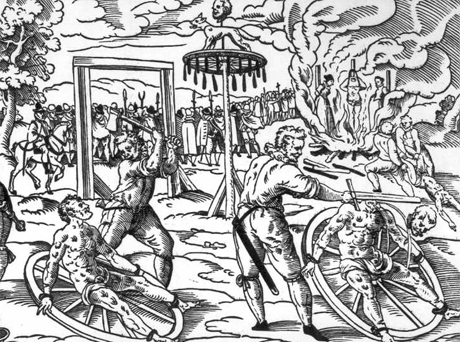
What’s that dog doing up there by the severed head? Any ideas?
Like Garnier and Gardinn, “Stumpy” Stumpp confessed to the killing and eating of children; fourteen of them, in fact, including his own son, a child born of the rape of his own daughter, Belle, and whose brains Stumpp noshed on. He also killed grown men and women, two of whom were pregnant and had their foetuses ripped from their bodies, and their hearts, “dainty morsals” as the nutter himself described them, eaten. Oh, and he fucked a succubus that the Devil sent him, having practised black magic since the age of twelve.
Outdoing the death of Jan Le Loup, in a Vigo the Carpathian style, Stumpp was put on the breaking wheel — a kind of rolling crucifixion popular in Medieval times– to have flesh ripped from his body with red hot pincers, had all four limbs broken and his head removed, before he was flung onto a burning pyre. Belle, a true victim wherever the truth may have lay, was also tossed into the flames with her father, for the dual crimes of incest, and of being a woman in olden days Europe. The pole-mounted wheel, atopped by Stumpp’s severed head, served as a warning from the church to the people of Bedburg to cut that werewolf shit out, seriously.
History paints Stumpp as a serial killer guilty of the actual crimes behind the werewolf dressing, but all of his misdeeds were confessed while on the rack, so, you know, judge with caution. There’s another theory that his trial was a political deal, with the Catholic Church using Stumpp, a recent Protestant convert, as a show of power; an example of what happens when you switch to the other team. If the Vatican fireplace is decorated by a werewolf-skin rug, we may be onto something.
In 2013, Werewolves are so neutered by television and film’s need for handsome young leads to appeal to that tweenage demographic, that anybody finding themselves accused of being one would more likely be guilty of a shit haircut than of eating from a big pile of dead children. Today’s werewolf wears a cone of shame to stop them from gnawing at the sore patch where their balls used to be. Not that it ends at werewolves; the entire monster oeuvre has been prettied up into Instagrammed mannequins. Vampires, witches, ghosts; even Aaron Eckhart’s upcoming Frankenstein’s Monster looks to be built from the parts of dead personal trainers and hunks. Although nothing tops the CW’s Beauty and the Beast remake, where a super handsome model guy with a tiny little scar that like he’s scratched his face while jogging past a bramble bush just screams “Don’t look at me, I’m deformed!”
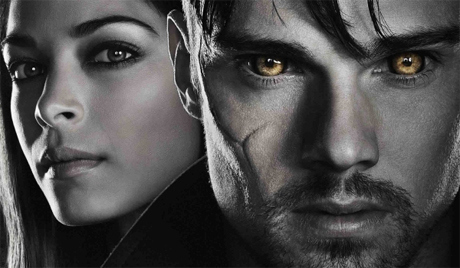
Jesus, look at this monster. GO LIVE IN THE SEWER YOU FREAK.
It’s easy to giggle off the werewolf trials as the naïve, uneducated nonsense of centuries past, as the thought of being burned at the stake, or the idea that the Catholic Church could set somebody up as an incestuous, murderous wolfman seems pretty distant in a world where you’re probably reading this on the train on a pocket supercomputer. Probably less so though, if you’re browsing from, for example, a modern-day Africa that sees children outcast, tortured and killed by Christian pastors for being suspected witches, or the slaughter of albino children so that their body parts can be used in magic potions. But on the bright side, if you think we’ve got a modern epidemic of paedophiles on our hands, just be thankful the paedo-werewolves have all died out.
***
If you liked this, check out the other Fortean stuff I’ve posted on here:
* Jimmy Savile and David Icke, All the Pieces Matter
* My Greatest Fear (aka the mental health slide of conspiracy theorists)
* “Back off, man! I’m a fantasist!” (aka the Ballad of Derek Acorah)
Also, my Kindle book, Dirt Baby and Other Small Mercies has some festively creepy flash fiction in it, if you’ve got a spare 99 pence/cents.


September 2, 2013
The Beach Diaries 2013 – #5 in an Occasional Series
* Outside of Iceland, a woman so blonde, so tall, and so inhumanly attractive gives me the urge to climb inside the freezer cabinets like Captain Oates and wait for death to take me. Roll on winter, when everybody’s wrapped beneath shapeless layers of sack-cloth for another 9 months.
* Another summer Saturday, another hundred-strong London church marching the length of the promenade like an army, clapping out a song in praise of Jesus.
* A daytripping mother explains to her daughter how manners don’t cost anything, and that Hello’s are always free.
“Hello,” she says, to people sat on the benches as they pass; “Hello. Hello. See?” she says to the little girl, with one last “Hello” at an elderly gentleman whose uncomfortable response suggests this is the first black person he’s talked to since the fifties, when he bellowed at one to get away from his car.
[image error]
“Say hello to the nice gentleman, honey”
* The Christians pass again, loud and massed together, with the passion and fervour of a political rally that’ll end in a fog of tear-gas and kettling.
“Yes Lord, yes Lord, yes yes yes!” they chant, beating chests and stamping feet, moving in a rhythmic way that’s somewhere between walking and dance. A man at the front blows on a red vuvuzela that parps into my ear as I’m forced to step around onto the shingle lest I be trampled underfoot by the stampede of God’s love.
“You’re the only one I need,” they sing, at their imaginary sky-buddy, raising up their hands as though so moved in that moment, they need to be physically closer to Jesus, even if it’s just by eighteen inches. Once they’re passed, a smaller group squawk into a crackly megaphone about “King Jesus,” all glory unto him.
I know I’m being the sneering, patronising atheist here, but such wide-eyed, ecstatic passion, when shorn of the context of church halls or revival meetings, and released into the walking world, only amplifies the outright weirdness of it all, sharply veering everything from child-like to childish. To those viewing from the outside, it’s like listening to a teenager in the first heady throes of young love reciting a poem about their classroom crush; the kind of thing that’s unearthed in a shoebox as you sit cross-legged in a parent’s attic, aged thirty, reading back the clunky similes and biroed hearts, and thinking you should burn it before anybody sees. It’s a curious thing, passion that’s fully real to one person, but completely delusional to others. As they joy-jig back and forth, I can make zero separation between the quasi-orgasmic exhalation for Jesus and footage of squealing girls fainting beneath One Direction’s hotel balcony.
* Up and down, go the Jesus Army, back and forth like the tide, hoping to save the souls of this wretched place, with all its sins as catalogued here by me these past few years. If they’d been able to read my thoughts outside of Iceland, I’d be party to another beach-side exorcism (See 2011′s Diaries), to draw out the slavering demons of Lust and Self-Loathing. Each pass features a different song, with the same rictus grins; lyrics of being born again, and a happiness that’s starting to seem manic, when surrounded by sunken, sweaty holidaymakers, struggling with tired children and flip-flop blisters.
Anyone who came down here for a quiet read or relaxing stroll is having to stomach the roving concert, or leave. This kind of behaviour is absolutely fine, of course, and I should rightly be beaten to death for the loud-mouthed, smug arrogance of owning a Darwin Fish fridge magnet and not keeping my views to myself. Some irony-based humour, there. I do hope you enjoyed it.
[image error]
“Have you heard the Good News? Jim Davidson’s dead! It was a heart attack, very sudden. Apparently, a little black girl spoke to him, and BOOM!”
* One of them stops to ‘mission’ at some old ladies on a bench. There’s some confusion when they’re asked if they know about the Lord and savior Jesus Christ, and they give that classic British Old Person response my grandad would always give in hospital when filling out the religious beliefs section on a form.
“I’m C of E.” But they muddle through, by politely nodding an “Oh… yes” when asked if they’re born again, and she bangs on about how Jesus just wants you to accept him as the only way. “It’s so simple!” she says, as though she’s pitching them cheaper car insurance. As she says her goodbyes, I wonder if I’m next for the cold-calling sermon, but she strolls past, possibly sensing my blackened soul is beyond redemption.
* The church group are a multi-generational bunch, and as the youngsters tout for business, wizened, sleepy grandparents watch from deckchairs beneath enormous hats. There’s an overwhelming sense of bubbled isolation, and of none of the revellers ever having had a chance to know anything else, cocooned in a community where it’s all Jesus, all the time, and Heaven help you (literally) if you dare not believe, when your entire world is comprised of the type of people who can’t even take a daytrip to the seaside without spending every moment accosting random strangers with the Good News.
* Overheard conversation snippets. A woman to her friend:
“My kids’ dads all got one thing in common. They’re all fucking ‘orrible, and they’re all fucking ugly.”
* After a long couple of hours of top-of-the-lungs singing, vuvuzela and drums tramping over the peace of summer’s precious final act, each further time the Christians stomp past me, I can no longer pick out the lyrics. Their words seem to say only one thing –
“If you don’t like Jesus, fuck you.”
The air fills with roars and rapturous cheers that would be cause for alarm if the J-word was taken out of the equation, and a plinky-plonky keyboard gets plugged into a huge PA system wired to a generator. It’s time to go home. At this stage, the missionary leafleting has begun, and anyone daring to queue for ice cream, or indeed, be outside on this sunny weekend, finds themselves Excuse Me’d into an uninvited conversation about whether they’ve heard about Lord Jesus. If nothing else, that one-track-mind lifestyle must be mentally exhausting.
[image error]
“We run this pier. You dig?”
* The journey home seems marked by chalk graffiti, left on various points along the way like clues. Through the town centre and past the other side, a number of lamp posts and walls are chalked with the legend WONDER GIRLS RULE. Has gang-culture finally hit the south coast? Wonder Girls sound like something from The Warriors, where they flirtily invite you back to their place to swig whiskey and make out, and everything’s going great, but then someone bolts the door, and the next thing you know, the shiny blade of a switch-knife has been shoved into your urethra.
Some twenty yards past the last Wonder Girls tag, a green message etched onto a trio of paving slabs reads STOP BAD LUCK. I quite agree. Down with it! I walk through the local park, where a freshly-married bride and groom pose for wedding pictures beneath the cooling shade of a tree. I quickly duck past the scene and round into the alleyway, where a jizzing chalk penis greets me from a fence post. Then, as I reach the final corner, one last masterpiece awaits me on the pavement. As I ponder whether the prickly-bollocked cock is poised to enter the curvy bottom, or is withdrawing from said back-pipe, post-coitus, the air is silent of vuvuzelas, and God is nowhere to be seen.
***
The Beach Diaries 2012 on Amazon.com, $3.99
The Beach Diaries 2012 on Amazon.co.uk, £2.99
The Beach Diaries 2011 on Amazon.com, $2.99
The Beach Diaries 2011 on Amazon.co.uk, £1.99
Amazon’s free Kindle app for PC, Mac, phones & tablets


August 12, 2013
The Beach Diaries 2013 – #4 in an Occasional Series

Statham, there. 5,000 people have found this blog by Googling for pictures of his cock.
** The arrival of a group of travelers has brought out the casual racist in the beach-goers, who pass by the twenty-odd caravans parked on the common, crooking their heads from atop moral horses as buck-legged as they are high.
“Better lock all our doors,” says a middle-aged woman with a furrowed brow, and a sense of genuine despair, as though she’s witnessing the unstoppable, final fall of polite society. From here on in, we’re surviving on the heat gleaned from burning bins, while fending off Gypsy cannibals with our M&S golf umbrellas. I’ve got a column on my Tweetdeck that shows every tweet with the word Littlehampton in it, and I’m finding it hard to couple the apocalyptic indignation and fist-waving “the council better do something…” fury with the rather quiet spectacle witnessed in person.
It’s lucky shitty TV and tabloids gave us the class-boogeymen of gypsies and ‘chavs’ to freely sneer at, with none of the public shame of dropping an actual N-bomb, because holding in all that hate could cause an aneurysm.
** A heavily pregnant girl in a tiny bikini throws up a gang-sign as she poses for a photo with her partner; fingers splayed in a W, and one eyebrow arched in a way that suggests you shouldn’t mess with her, because she’s got a glock with the numbers filed off tucked into the waistband of her creaking thong.
“Why you always gotta do the fingers?” says the bloke, “I hate the fingers.”
** As I’m eating my tuna roll, a couple set up their sunbathing pitch to the front of me. He’s a fifty-year-old bodybuilder with skin like the cover to an ancient grimoire, and a set of those strange abs you see on middle-aged men who hit the weights, but still eat like they’re twenty five, where they sit on a rounded, protruding stomach like bobbing apples. His forty-year-old tattooed Barbie girlfriend’s pneumatic pumpkin tits lay rock solid on her chest as she bathes on her back; duad sunsets on the horizon. The whole time they relax beneath the rays, one of his hands is casually stretched across and cupping her breast.

Cor! Eh, lads?
** A shirtless man talks loudly to two women as they pass me.
“Shell and Georgie are the kind of girls, by the time they’re 25, they’ll be abducted by a load of Muslims, they’re so fucking slaggy.”
** Sandy the Sandcastle, my old nemesis, leaps in front of my path, and holds out one of his Mickey Mouse fists for me to bump. I’m glad I look like a fist-bumper and not a hugger, as my real life social protocol when people are dishing out hugs is to hold up a fist and tell them to pretend they’re Dr. Dre or one of them other blokes off of rap.
** The house where the topless mannequin lives now has a Christmas holly wreath and Santa hanging on the front door. It’s July, and it’s ninety degrees. Later in the week, the wreath has been removed, but on the outside wall below the second floor window, there’s a large stuffed dalmatian, propped up so it’s peeping in like a pervy 1970s window-cleaner.
** A single dad placates his small daughter with cries of “it’s alright, I’m right outside…” as he sends her alone into the womens toilets. A female bystander has her own daughter take care of her, and the two daytripping parents stand outside discussing paedophiles as they wait, and whether there are more about these days, or if they’re just better publicised.
** An absolute prick-end with a guitar, who’s been laying in wait for this moment, steps out onto the prom as the train passes and strum-wails an improvised, two-chord refrain at the passengers, about how they’re are all on a train, at the beach, on a train. The dozen or so girls drifting sycophantically in his slipstream like moths flitting at a lava lamp chuckle and coo, wide-eyed and damp with how fucking clever he is, this John Lennon of Littlehampton seafront. For people spotters, the presence of a guitar slung over a back in a public open space handily marks an individual as the main twat of any group.
** As I’m sat alone reading on Millard’s Rise, a group of four girls and a guy walk by. One of the girls wolf-whistles, and another makes the sort of clicking noise you’d do out of the side of your mouth if you were trying to get the attention of a pony. I glance up, to the sound of their laughter.
“Phwoar!” says one of the girls, all eyes on me, “He can pump my brains out any day,” as they cackle their way out of sight. I’ve touched on this before, and while the Everyday Sexism project highlights the awful leering catcalls and public lechery women suffer in streets and on trains, what of unattractive, lone men being ridiculed by the opposite sex, eh? Eh? Because that shit happens a lot; 2012′s Diaries are riddled with it. I think my white male privilege precludes me from throwing around the word VILE, all in capitals. “Just had some VILE abuse at the beach from some real life trolls; SICK and VILE.” I’m not Mary Beard, I’m just bearded.
As a punctuation on the moment, a model walks by. An actual model, trailed by a photographer, make-up artist and handler, all shining blonde hair, crazy legs and –
*click-click* *looks up, gets pelted with sugar lumps*
[image error]
“Want to to go the prom with me, Millard? Just kidding, you ugly motherfucker.”
** Two Downs Syndrome men on an outing yell at each other.
“You’ve got a big nose!”
“Stop it!”
“Shut up, big nose!” As the first chap threatens to hit one of the women in their group, and stomps away while loudly declaring himself to all “a fucking failure,” a helper finally steps in.
** Another intellectually disabled man bellows at the lifeguards from the back of the train while he waits.
“What’s your name, mate? Your name?” Soon, he’s offering them water from his bottle, and demanding they raise the flag and play some music “…so that everyone on the beach can have a dance.”
** On the back of the toilet door, daubed in thick black lettering is the question “ANY COCK HERE TODAY?”
“YES,” I think, “I’M CURRENTLY WEEING OUT OF IT.”
** An empty can of lager lays on the ground, dribbling its last drops like a gutter-drunkard slavering an unconscious string of warm drool from his gob. Next to the can, the word FUCK has been cack-handedly written onto the concrete of the promenade. Initially, I think it’s been written in lager, and I’ve caught it before it’s dried, but a week later, the can is gone, while the FUCK remains.
Metallica can use ‘while the FUCK remains‘ for the title of their next album if they like.
** While it didn’t fit the rhythm of the paragraph, I feel like I should confess the real ending to the wolf-whistle/model moment; the post-credit stinger you’d have missed had you ran for the exit as soon as we faded to black. Once the cruelly blonde, mockingly stunning model had swayed around the corner, an enormous man, looking exactly like a deflated Big E. Langston, sauntered past me while whistling to himself and clad in an FBI/Female Body Inspector shirt. In that moment, the world seemed to right itself.

FBI, open up! There’s bodies needs inspectin’!
** An old French woman with an accent so heavy it seems like a racially offensive stereotype exhibits a frightening level of irritation that sweeps the seafront like a flash-fire.
“Ooh, what’s he doing up there?” she says, so French, and so irritated, that the O’s in the “Ooh,” would be jagged with vibrato and tumbling off the side of the page, down into the margins, if they were accurately transcribed. It’s so overwhelmingly patronising — worse than the presenter of a TV consumer rights show — that I feel waves of pity for the poor lost grandchild that’s presumably on the receiving end of her barrage of disdain, for, again I assume, absentmindedly wandering down onto the shingle to fill their pockets with shells.
“What are you doing all the way up there?” she cries, now with a clear disgust in her voice telling the tale of how she’s been let down, yet again, by this absolute idiot-child. “It’s so silly. You’re so silly.” This is the verbal equivalent of holding a thumb and forefinger half an inch apart to tell somebody “This is how big you are. You are a pea, and I am a planet. You will never be anything, and I should have kicked your mother in the belly.”
Perhaps she reminds me of my old teacher, Mrs. Garner, similarly French, who enraged my mum by describing the then-seven-year-old me as ‘demented’, but I feel as though I can’t bear to see the forlorn child shuffling away from the sight of the ocean and its endless possibilities of freedom, to return to the scary French grandma who doesn’t let them have sugar or sit up after eight pm, so I keep my back turned to the direction she’s aiming her withering gaze. Then, he emerges, the object of her scorn –
“I needed a wee!” replies a thoroughly exacerbated, white-bearded, sandled and sock-kneed Englishman of about sixty, who appears from, I guess, all the way up there. “That’s where the toilets were!”
***
The Beach Diaries 2012 on Amazon.com, $3.99
The Beach Diaries 2012 on Amazon.co.uk, £2.99
The Beach Diaries 2011 on Amazon.com, $2.99
The Beach Diaries 2011 on Amazon.co.uk, £1.99
Amazon’s free Kindle app for PC, Mac, phones & tablets


July 23, 2013
Dissecting Bray Wyatt
“Welcome to a lot of words.”
By merely taking a lazy, side-of-the-eye glance at one of his promo pictures, Bray Wyatt may seem like a 21st century do-over of Waylon Mercy, a character long-considered one of wrestling’s greatest missed opportunities. For what little time he was around, Mercy had a big impact on the memories of fans. A blatant Max Cady riff, Mercy was a Southern Gentleman who — as a heel, mind — shook the hands of fans as he walked to the ring, and protested his innocence (“I slipped!”) when DDTing a jobber on the concrete floor. Unfortunately, Mercy’s run came at the wrong end of Dan Spivey’s career, when his crumbling knees made Great Khali’s look like those of a permanently pre-pubescent Russian gymnast, and now, eighteen years later, we have Bray Wyatt. But more than just a chance at redeeming lost opportunities, Wyatt’s Southern Gothic is the most entrancing thing to hit wrestling in years.
It’s such a rich, layered character, clearly drawing influence from a lot of different places, that I’m fascinated by trying to spot the various hat-tips and homages. Don’t misunderstand the intention of this piece; this isn’t about accusing him, or whoever’s creatively behind the character of plagiarising; it’s a celebration. There are no new ideas, and wrestling has always been about digesting and co-opting elements from popular culture and puking them out into something fresh, something for that world, which exists solely in a bubble. Wrestling is its own beast, and Bray Wyatt walks in that world a glorious mish-mash of ideas, tics, and puzzle pieces from our own. So where does he come from?
Above all else, the presence of Charles Manson looms heavy over the Wyatt Family. Even the name — they’re a Family — harks back to the infamous hippie kill cult. Just Youtube some of the many hours of Manson’s prison interviews, and you’ll find the same themes of being lied to by your parents, and deceived by authority and The Man, and all with that confident patter that’s equal parts a favourite, bohemian uncle reading a bedtime story, a rabble-rousing anarchist calling you to arms, and Satan tempting Jesus in the desert. While you may be blinded by the big words, nonsense nursery rhymes, and verbal showmanship leading you this way and that, if you could sit down and leisurely read back a transcription, it’s just the ramblings of a lunatic with a messiah complex. In one of the ‘We’re Coming’ promo videos, Wyatt says the following line:
“I’m everything. I’m the dirtgrass beneath your toes. I’m a boxcar and a pack of matches…”
This is a paraphrasing of cheeky Charlie Manson himself, more notably, it’s a quote from a video that, thanks to Youtube, has become his most famous promo, his “We’re coming for you, nigga,” encapsulating everything about the most densely complicated man in history in 33 short seconds. He’s at once childlike, playful and mystifying, but never further than a sinister veiled threat from reminding you who you’re really dealing with. Check out the video below.
Interestingly, while Manson proclaims himself ‘nobody’, Wyatt conversely claims to be everything. In the background of one of the early Raw promos, a barefoot girl is seen hanging on the branches of a tree behind Wyatt, an image deeply evocative of that spirit of ’69, when a group of similarly shoeless innocents, brainwashed by their charismatic leader, barged into a Hollywood home and stabbed an 8 1/2 month pregnant woman sixteen times in the stomach.
Another famous family runs deep in the blood of the Wyatts, that of the one found in the Texas Chain Saw Massacre. Aside from the lumbering physical brutality, there’s a lot of overlapping visuals, as the Wyatt compound is a dilapidated, ramshackle house adorned with skeletal gizzards and vague hints at past atrocities, backed by a chorus of chirping crickets and distant screams, way out in the swampy middle of Fuckwhere. Similarly, there’s a vibe of Rob Zombie’s Devil’s Rejects, although that’s likely down to an influence crossover.
A broken nose in NXT gave the opportunity to take the TCM vibe even further, with a protective mask and butcher’s apron that played like a gritty modern reboot of Leatherface.
Even the explicit, deliberate term ‘Wyatt compound’, as used in the WWE’s ‘Search for the Wyatt Family’ videos, suggests something less a home, than an us-against-them siege mentality against the rest of the world. The word ‘Compound’ has a strong subliminal connection with its most media-famous use, that of Waco, where cult leader David Koresh, self-identifying reincarnation of Jesus, and leader of his own 132-strong Family, was burned to death with the rest of his cult by the FBI at the close of a fifty-one day stand-off.
For a purer influence, we have to step away from pop culture and back inside the bubbled world of pro wrestling. Like the Tom Waits interview that clearly formed the basis for Heath Ledger’s Joker performance, check out this video of Florida’s Bugsy McGraw challenging King Kong Bundy.
The timing and cadence is all there. The tics, the mania, the wild eyes and random spurts of laughter; add some Manson-type content to the delivery and you’re halfway to Bray.
Deliverance runs deep in the DNA of every Hixsploitation piece, from The Hills Have Eyes and Justified‘s Bennett Clan to the Wrong Turn series. Ned Beatty’s arse-bandits are the bucktoothed Adam and Eve to every rutting hee-haw who ever raped or gutted unsuspecting city folk in a wood, and on Monday nights, it’s there again in Wyatt’s hulking pair of inbred-looking bodyguards. Rowan in particular looks like he couldn’t count to one without unsheathing his nob, but if he did take it out, you’d be squealing like a good’un. The WWE roster, with their neat black trunks, tattoos, tans and sensible haircuts fill the role of the naïve out-of-towners, and even though the Wyatts are taking them on on their own turf, that threatening sense of a culture clash that’s going to end badly for the cosseted lambs hangs heavy in the air.
Wyatt’s début promo in NXT, a mesmerising character introduction, ends with a seemingly non sequitur break into the opening refrain from the Rolling Stones ‘Time Is on My Side‘. This is a direct homage to the horror film Fallen, where the song is used by the Devil as a mocking way of revealing his possession inside the bodies of innocents, and for all Bray Wyatt’s talk of ‘saving’ folk, this, like the dog-bark of a Tourettes sufferer, is his release; his instinctive admission that something evil lurks within.
The Fallen reference is particularly interesting in light of a leaked NXT promo floating around on Youtube. Here, a pacing, manic — and at points, frightened — Bray Wyatt talks of an evil “inside him” that “hasn’t been seen by humans in a long, long time,” before addressing an unseen presence off-camera that he names as Samael. In Jewish lore, Samael is the Prince of Demons, and according to his Wiki entry, “a figure who is accuser, seducer and destroyer.” Sound familiar? Samael is also considered to be the Angel of Death (follow the buzzards), and is often charged with the role of Eve’s seducer in Eden.
Is Wyatt possessed? Or in the least, does he believe himself to be? Check out the video below and see for yourself.
His nickname, as the self-proclaimed ‘Eater of Worlds,’ is a line from Stephen King’s murderous space-clown novel, It. In it (or, “in It”), Pennywise the Dancing Clown says of himself: “I am the eater of worlds, and of children.” Wyatt’s smiling persona, in his brightly coloured Hawaiian shirts, arms outstretched, while not quite a clown, is visually far-removed from the more obvious evils of, say, a black leather-clad Ministry-era Undertaker. The look itself, as well as the charming Cajun demeanour, borrows heavily from Cape Fear‘s Max Cady (and vicariously, Waylon Mercy), but a beard on a cult leader will always say Manson — or Evil Christ, which amounts to the same thing — while the hat’s a nicely disarming touch.
I couldn’t pinpoint the lamp, an integral part of the Wyatt look and entrance, but in discussing this on a wresting forum like a guy who’s never honked a tit with his thumb and forefinger, someone pointed out how tonally similar the lantern, and a bunch of other elements are, to The Others from Lost. Once you start thinking outwards, there are a lot of dots to connect, like the empty rocking chair from Jacob’s cabin, or even the Others suddenly revealing themselves from the darkness by lighting flaming torches; an inverse of Bray blowing out the lantern, and a moment when, as the Wyatts claim, the audience realises that they were there all along. Interestingly, The Others were just masquerading as dumb hicks, in false beards and dirty clothes, to hide the real, darker truth beneath.
But like all good art, the Wyatts are subjective; a Rorschach test for the audience to see what they will. Like that time some prankster switched my Rorschach pictures for ink-blot drawings of my scout master’s genitals, maybe an empty chair rocking by itself was simply a horror cliché that whoever directed the video thought would look creepy. Remember those pointless Chris Jericho viral videos of sinister schoolchildren that didn’t connect to anything? Eventually it’s just influences bending back on each other, and most dirt roads lead back to the common ancestors of the genre. I’ve probably already committed the crime of pretentiously over-thinking and seeing things that aren’t there, but as final example, take HBO’s True Blood. Six seasons in, and I still sit through the fantastic opening credits every week. If you were looking, you might see some Wyatt Family influences in there too.
It’s likely they’re both just chowing from the same bowl of cultural gumbo, but the Wyatt Family Titantron, with close-ups of insects and abandoned bayou settings; of nature, left to her own devices, suffocating man, along with True Blood‘s heavy Southern Baptist religious overtones (The début NXT promo mentions ‘the good book’) and demons being cast out, makes it easy to draw parallels between the two. As the character progresses, I’m sure there will be other nods, and I’m excited to see where it’s all going. Up to this point, I feel like I’ve been pretty comprehensive, but if there’s anything I’ve missed, or something you’ve interpreted differently, post away in the comments. I’d be particularly interested to know the thinking behind the name of Wyatt’s finisher, Sister Abigail.
More wrestling posts:
WWF Magazine’s Anti-Masturbation PSAs
Andre the Giant’s Bra Sunglasses


July 15, 2013
The Beach Diaries 2013 – #3 in an Occasional Series
** Just when it seemed like the map-makers would have to rebrand the United Kingdom as ‘The Land of Always Winter’, suddenly we’re all living in Mad Max II. This time last year, the grass on the common could only be navigated in wellies, but now, it’s a scorched-Earth yellow, with balding little deathbed tufts. Anyone nodding off and awakening quickly is liable to become confused and start gnawing on the fuel line of the first car they see, like a rabid raccoon, fighting off bystanders with lethal force as they fill their inflatable dolphin with precious, precious petrol.
Heat like this distorts everything; the sexy and beautiful are even more sexy and beautiful, while those who’d usually cover themselves with baggy clothes or a sunken posture swan around with catwalk confidence. Protruding bellies wobble proudly, as though they’re home to a shredded set of Tyler Durden abs, and drooping arses swagger like they’re still where they were twenty years ago. Look in any direction, and you’ll find a turning head. Husbands and dads who can’t help themselves; single folks happy to enjoy the bounty of flesh; groups of friends sharing a fine set of pecs or a wazzo pair of jugs with nudges; shirtless lads, who consider their blatant stares flirtation in and of themselves, so they have them be hard, full and lingering, hoping for a response. Thermometers need another reading once the red climbs above thirty degrees. 20 – Fine. 25 – Hot. 30 – Human Meat Market.
** A posh family, consisting of parents and their three teenage sons, set up on the sand nearby, erecting a tent in which to change into their swimwear, and eating fruit out of expensive-looking containers. The mother, with a finger in one ear like she’s part of a vocal harmony group, makes a phonecall, and tries to help a friend locate them, amongst all the hundreds of other tourists on a beach that’s virtually creaking at the seams.
“Opposite the train. A row of green and blue beach huts; we’re between those….” A pause, and then — “…there’s a big family of blacks nearby. Right beside us. Yep, just look for them. Okay, see you in a bit!”
** My wandering eye is snared by the sight of an old lady, unsteady on her feet and looking like she’s about to topple onto the sizzling concrete and fry like a broken egg. Then I realise she’s painstakingly balance-walking all the way along the painted white line that runs along the centre of the prom, as though standing atop a tightrope. Her arms are outstretched, while her tongue pokes in childlike concentration, perhaps with imaginary crocodiles snapping at her toes, or boiling lava waiting below should she fall. I overtake her, but check behind me a couple of minutes later. She’s still there, working her way down. One foot in front of the other, in front of the other, yet to fall.
[image error]
“Wish you were here!”
** A little boy challenges his mate to a bunch of running races from the prom to the sea. Each time, the second boy refuses with a weary shake of the head, choosing to stay on the bench instead — even on the “Ready. Set. Go!” that sees his friend sprint madly towards the waves — and each time, the first boy returns puffing and victorious, arms raised like an Olympic champion.
“I win by forfeit! I’ve beaten you six in a row now. Let’s go again!”
** An exhausted child, dragging her heels behind her parents, cries out in anguish –
“Why do they call it Littlehampton? It’s soooooo big!”
** A dad stands in a hole so deep, he’s only visible from the neck up, wearing a floppy sunhat so comically oversized, one can’t help but suspect it was ordered by the wife because “You know how burnt you got last time.” He tosses spadefuls of sand over his shoulder in a frantic way that suggests he’s trying to escape his family and start a better life.
“Got everything, dad? Sandwiches, bucket and spade, suntan lotion, passport… passport?”
** A gang seems to have formed out of the disparate outcast beach loners you see endlessly traipsing up and down by themselves, like those lonely schoolchildren who fill their lunchtimes with solo laps around the playground, eating as they pace, and ducking errant footballs and familiar catcalls. These men are my scrying mirror into a likely future, with each having traits that mark them out as somebody who’ll be going back to an empty home, and they all have at least twenty years on me. Maybe there’s something comforting about their recent alliance, as I pass them all sat in a row on the long bench, the aging Littlehampton loner supergroup; the suggestion that I might have the option of some companionship in the final stretch of middle-age, should I feel myself wanting. That probably beats having to get up and move in the middle of a chapter when a large group of cackling teenage girls, whose speech would be one long, uninterrupted beeeeep pre-watershed, start exchanging faux-casual stories about their virginity-loss, after pitching up three fucking feet away.
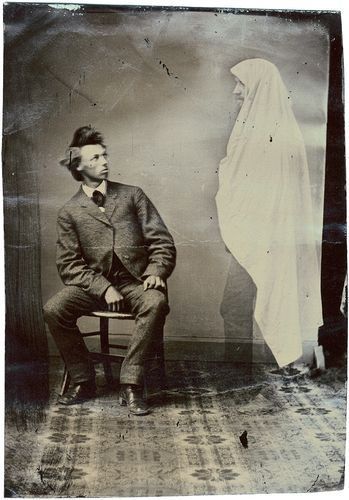
Working on my tan (r)
** Most days, but especially on those like today, in this summertime meat market, I feel like a ghost. I’m merely haunting the living world, drifting on the peripheral. Occasionally, someone might hear a footstep, brushing it off as a trick of the wind, or catch the rustle of a notepaper in passing, but in truth, I’m not really here.
***
The Beach Diaries 2012 on Amazon.com, $3.99
The Beach Diaries 2012 on Amazon.co.uk, £2.99
The Beach Diaries 2011 on Amazon.com, $2.99
The Beach Diaries 2011 on Amazon.co.uk, £1.99
Amazon’s free Kindle app for PC, Mac, phones & tablets


July 9, 2013
The Beach Diaries 2013 – #2 in an Occasional Series

If I suffered with this, I’d have been murdered. Read on.
** Almost as soon as I leave the house, I’m “Excuse me mate”-d from a car window. The shirtless man at the wheel asks me for directions, a thing which, traditionally I’m very bad at. It’s the real-life equivalent of the final round in a TV quiz show. There’s a ticking clock, the spotlight of attention (and no conferring), and the pressure to deliver information, succinctly and correctly. The right way to deal with this situation, is to summon the spirit of N.W.A.’s Straight Outta Compton — “You are now about to witness the strength of street knowledge…” followed by clear and concise instructions that doodle a simple coloured line from points A to B. Instead though, as always, here’s what actually happens. I dramatically point a finger yonder, ram-rod straight as if to suggest absolute confidence; my arm an infallible, living compass.
“Yeah, up there. Straight up there. Just keep going straight, and you can’t miss it.”
“Thanks, mate,” says the man, thinking that he’s lucked out by a) already being on the right path, and b) bumping in to such a gushing fountain of local wisdom. He can’t miss it! Even if he tries. This scorching, ninety-degree summer day shall no more be wasted crawling through the back-roads of Sussex in a boiling metal box, peering at street-signs that have been childishly defaced, as this kindly stranger has guaranteed a safe, fast journey to destination’s end.
Of course, what this guy and his passenger don’t know, is the only place I’m sending them isn’t even on a map, as it’s the metaphorical town of “The Fuck Away From Me.” This flawless system of instant, confident sounding, directionless directions has never steered me wrong (unlike those suckers behind the wheel!), and it’s the perfect crime. You could be luring them to the other end of town, or to the slippery banks of the county urine lake, and it doesn’t matter a jot, because you’re never going to see these lost and confused out-of-towners again. Never. There’s no recriminations from bad directions. Ever.
** As I approach the river, a mad, rhythmic jingling sound fills the air. Have a lifetime of bad directions come back to haunt me in the Karmic form of a 50ft Santa who’ll descend from the sky to drown me in an enormous glass of milk? JING JING JING JING JING. Just then, 25 Morris Dancers emerge around the corner, like a flamboyantly violent street gang from The Warriors; their legs wrapped in bells, with swirling handkerchiefs clasped between their fingertips. Mixed in with the mostly-old men are some younger chaps; sons and grandsons, praying they won’t bump into any girls from school as they JING JING JING along the riverbank.

The fine English tradition. Of dressing and acting like a prick.
** A vintage spitfire draws upturned heads as it loops, swoops and barrel-rolls in the cloudless blue sky above the seafront. I make it ten times more exciting by telling myself it’s flown straight from a WW2 dogfight through a mysterious time-hole. His daredevil twirls are merely the result of a madness brought about by the sudden appearance of a modern, alien landscape, jutting out of the countryside; the guttural engine noise, the primal roar of a broken mind.
** I pass a man with sun lotion covering only his tattoos, in blotchy white patches. Is this a thing now? Or maybe it’s Tipp-Ex, and in going publicly topless for a tan, he found sudden shame at old choices and tried to fix them like you would a last-minute typo on a CV.
Further down the prom, an elderly Jamaican man returns from the fish stall with an enormous bag of fresh oysters; dozens of the things. He’s downcast at the negative reaction of his wife, who scalds him for buying so many, so early in the day. They’re down from London on a coach, and not going home for another six hours.
“Are they alive?!” she asks. “They’re boiling in there already! They be off by the time we get home! You’ll stink the place out and end up in hospital!” One of their friends jokingly suggests opening a seafood market on the prom to get rid of them, but as the old Jamaican man looks down at his weight of oysters, and back again at the sour face of his wife, he thinks to himself that they don’t seem much of an aphrodisiac after all.
The treating of the beach like it’s the fucking moon, or some weird Westworld playground they can use and abuse before clearing off is a common trait in the many daytripping tourists. Fifty yards from Oyster Man, a family of four Londoners stand amid the essential equipment they’ve brought for a half-day at the seaside. A fully-sized BBQ you could grill a dead elephant on, complete with gas bottle; two enormous speakers that look like they belong on the main stage at Glastonbury; a DJ turntable and mixing desk; and complete with about six miles of extension cord, a diesel generator.
** The pier, usually featuring such graffiti as the octopus with big boobs — which has survived through the winter to its second year — or like today, “BEN SUCKED MY BIG COCK,” is covered from end to end, inside and out, with large, passionate lettering (if lettering can be inferred to be passionate, but the strokes are bold and clean, like slashes of a knife), that reads:
FREE SYRIA
FREE SYRIAN ARMY
It must have taken them forever, and I try to picture the spirited young activist diligently etching at every exposed inch of salt-worn timber with a rock of chalk, with the ocean lapping at their knees, surrounded by tattooed waders and shirtless lads with ¾ mast erections splashing at their YOLOing prey.
** “Leaping lizards!” exclaims a dad.
** I make a mental note (and a physical one, in my actual notebook) to find out if “Blonde women in aviator sunglasses” is a porn genre that actually exists. It’s not. But it should be.
** A woman passes with a shoulder bag emblazoned with the logo of KMart Singapore; at once exotic, yet achingly not.
** Two boys of about thirteen join the back of the ice-cream queue.
“Your mum’s a proper milf,” says the first.
“I know,” replies his mate, with a sad resignation. A few moments later, a woman in her late thirties, holding a purse and wearing the fuck out of a purple swimsuit, joins them. The first boy looks at her and grins, half-cheeky, half-embarrassed. The second casts his gaze down at the ground.
[image error]
“A 69 with a flake please, mam. 99! I MEAN 99! Shit.”
** Overheard conversation snippets. A wife to her husband:
“They used to be known as the Snobs of Bray Road. First to get a colour telly!”
** Later, as I’m reading a book on the common, some shirtless men step over the wall and pass behind me, and I hear one of them shouting to another man.
“Hey, pal! Hey, pal! OI!”
As someone who’s half-retired from Beach Diarying, I pay it no mind and keep hunched over the novel I’m reading.
“He’s got earphones in,” say the man’s friend.
“Oh, has he?” he replies, with an edge of anger now plain in his voice, as they start making their way down the slope towards their car. “Cos I asked him for directions earlier, that’s why I was so late round yours. Cunt got me lost for half hour…”
The four of them screech aggressively out of the carpark, drawing looks; top down and shirts off.
For the record, I didn’t have earphones in, but my lustrous Jon-Snow-from-Game-of-Thrones hair was all about my face and ears, so maybe it looked like I did? A few years ago, an old man sitting on a wall yelled at me to get my hair cut, like it was the sixties. Luckily, I never took his advice, because I likely just unwittingly haired my way out of a situation that surely would have escalated into a four-man beach-kicking. Also, I was a good couple of miles from where I’d spoken to that random stranger, hours before, on a beach surrounded by hundreds of people. I’ve always suspected it, but this probably confirms that I have ‘a look’, that is, I’d be easy to draw a cartoon of, and quick to be picked out of a line-up. I’m going to assume that I’m just too goddamned Hollywood glam for this town, rather than being a ill-dressed local oddball.
***
The Beach Diaries 2012 on Amazon.com, $3.99
The Beach Diaries 2012 on Amazon.co.uk, £2.99
The Beach Diaries 2011 on Amazon.com, $2.99
The Beach Diaries 2011 on Amazon.co.uk, £1.99
Amazon’s free Kindle app for PC, Mac, phones & tablets


June 19, 2013
The Beach Diaries 2013 – #1 in an Occasional Series
I can’t switch it off. Over the course of two full summers spent people-watching and consciously tilting an ear towards the conversations of strangers, I’ve infected myself with an instinctive, unstoppable urge to be constantly gathering material while I’m at the beach. Like a sleeping dog who twitches upright at the rustle of a pocket, I’m in a permanent state of alert, never fully able to relax, and helpless to stop my inner voice from rambling off pretentious internal narrations about the things going on around me. As I’ve already said, there won’t be any more books, but an occasional long-form, long-winded piece on here, two or three times this summer, might act as enough middle-ground to keep me sane. So here we are.
The problem is that once you become aware of it, just like Roddy Piper putting on the sunglasses in They Live, it’s clear that there’s material everywhere you look, and you can’t unsee it. The world and its inhabitants and their actions are just too awful and beautiful to go unrecorded, even if you’re not going to stick it in a book. As if to prove a point, the first human voice I hear on leaving the house is shouted into the street through an open front door.
“… fuckin’ niggers…” it yells, with a “Cuh!” intonation, like he’ll add “Those cheeky little tinkers!” once I’ve gotten out of earshot.
***
Once at the beach, I wonder if I’ll feel any different than previous summers, having spent the last few months sweating out an intense, daily hour of yoga, and getting into semi-decent shape. Would I strut inside my lowest-waist-size-ever ¾ length shorts like a peacock, with an “Alright, ladies?” twinkle behind the shades, aggressively sunning myself dead-centre of the promenade while people step around me, feeling like King Sex of Fuck-Town? No, is the answer. I wasn’t aware of any great change in my self-image, or head-cocked puff of the chest when passing groups of sunbathing women. Perhaps if I eventually carve myself out a Ravishing Rick Rude torso, I might feel — or act — differently about my place in the social landscape, shit, I might even switch sides and become a shirtless lad; but for now, same old ‘ting.
Men occupy this strange space where they’re neither a victim of terrible body-shaming, nor afforded the idea that, no matter what, they’re all beautiful in their own way. Quite rightly, there’s a big movement against the terrible media pressure on women to look a certain way, with spreads of rake-thin ‘perfect beach bodies’ alongside gleeful exposés of some actress who dared to have a fat knee on the red carpet, but the strange flip-side of that is the idea of the beautiful snowflake, where every woman is beautiful, and should accept themselves as such. Men though? Get over yourself, fatty/baldy/you arse-faced uggo. Not that I’m one of those laughable Men’s Rights idiots, nor am I sobbing because nobody’s tossing roses in my direction, and I don’t even know what point my meandering beach-mind is trying to make. Maybe it’s just that men don’t have that weird entitlement or right to feel attractive unless they literally are the male equivalent of those magazine-cover model types that people (correctly) rally against. As I ponder this, I try to picture a Dove advert with a load of ‘real men’, consisting of sweaty builders jiggling about in their underpants, saying how confident and sexy they feel now they’ve learned to love their bodies.
All I know is that Bernard Manning (or any overweight male celebrity of your choice) was never considered to be a beautiful man who should be proud of his sexy curves, he was just a fat fuck.

This is what a real man looks like, you BODY FACIST
***
Much as I’m trying not to slip into old habits, certain things just prick up my lugs, and form the words ‘Overheard Conversation Snippet…’ in my skull, and before I know it, I’m scribbling madly into my notepad like 2013 never turned. I’ve not even found a place to sit down when two women pass me.
“Her dad wanted her to marry a farmer, after her husband died.” Later, another woman, very posh, interrupts her friend mid-conversation and says:
“Darling, I know I work with the hearing impaired, but please don’t talk to me like I’m retarded.”
***
The first jarring sight at the beach is that of a day-tripping elderly man in a wheelchair being pushed by a care-home helper. The mental connection with my grandfather, who died since the last set of Beach Diaries were published, and who I’d similarly wheeled along the river, is so instant, the memories curl themselves into a fist and launch straight into my gut. For a while, I find myself emotionally winded, and I walk it off like you would a kick to the shin.
Later, a lad in a vest keepy-uppies a ball over the small wall and heads towards the sands. His phone blasts tinny, foul-mouthed gangster rap, all “fuck bitches” and stuff about money, guns and hoes. A severely handicapped man in a wheelchair squeals with abject delight at the sight of the football, and the lad freezes as he’s slowly wheeled past in his enormous motorised chair. Suddenly unable to cast his gaze from the floor, he clasps the football tight like a well-chewed security blanket, robbed of his urge to bluster as the grinning disabled man passes; the scene soundtracked by a raucous celebration of bullets and rough fucking in the toilets of ghetto nightclubs, blasting out of his pocket.
***
As I’m about to leave, a middle-aged man standing above me on the prom makes a phonecall to another man, called John. He’s the sort of man who says the name of the person he’s talking to constantly, with the word ‘John’ thrown around willy-nilly like punctuation. The purpose of the call is to alert John, at short notice, to a job interview tomorrow. He’s to give a presentation to the ominous sounding ‘financiers’, because the other candidate pulled out, for personal reasons.
“You’re the only one in the running,” says the man, in that upbeat manner people have when they’re gifted the rare task of delivering good news, “The job’s yours!”
But as the call progresses, John’s self-doubt kicks in, and the man’s voice takes on a firm but fair, fatherly tone.
“John, John, stop looking for gremlins. No, of course you’re not second best!” From there, it’s all downhill, as a quick, pleasant phonecall disintegrates into a harried counselling session, where one party suddenly finds themselves having to talk the other down from a metaphorical ledge. The man’s fraying patience manifests in him firmly using the word ‘mate’ twice as much as all the ‘John’s he’s been recklessly tossing about, as the latter tries to talk himself out of a £60,000-a-year position, up from his previous job’s mere £45k.
“You’re really winding me up,” says the man, with a threat of “driving round your place right now to bash you up.” This seems to pacify John, as the man’s voice drops out of the seething rage zone, and back into the sort of creepy business-speak pep-talks you see on The Apprentice.
“Look,” he says, “They don’t want pie charts. Just go in there with bags of positiveness; bags of business acumen…”
He hangs up on good terms, but I’d bet the farm on John ringing in tomorrow morning to call it off. “I’m in bed with bad guts and bellyache,” he’ll say. And that 60k a year will go wanting.
***
The Beach Diaries 2012 on Amazon.com, $3.99
The Beach Diaries 2012 on Amazon.co.uk, £2.99
The Beach Diaries 2011 on Amazon.com, $2.99
The Beach Diaries 2011 on Amazon.co.uk, £1.99
Amazon’s free Kindle app for PC, Mac, phones & tablets


May 30, 2013
The Daily Mail Formula
It’s been pointed out before that the Daily Mail’s repeated leching over teenage girls can be handily collated by popping the phrase ‘all grown up’ into their search bar, but scientists had yet to crack the code that simultaneously latches on to the two main agendas they push with their stories about females, namely –
#1: The sexualising of underage girls.
#2: Helpfully exposing all women over 25 as the disgusting, ashen hags they are.
Then, a scientist (me), saw a headline reading “…older than her years,” thought “that looks familiar,” blundered into the Daily Mail’s search bar and did this:
And here’s what came up.
For a rag who gave such a savage review of Kick Ass, they sure have a thing for Chloë Moretz. Luckily for her, she only has to wait a few more years, then she’ll be a haggard old crone worthy of only scorn, and ‘unflattering’ pap shots on the beach where she’s got an embarrassing bit of elbow skin or something.




